Indoor plant ideas: 25 ways to create stunning house plant displays
Revitalise every room in your home with these indoor plant ideas – from textural ferns and trailing foliage to large-leafed beauties
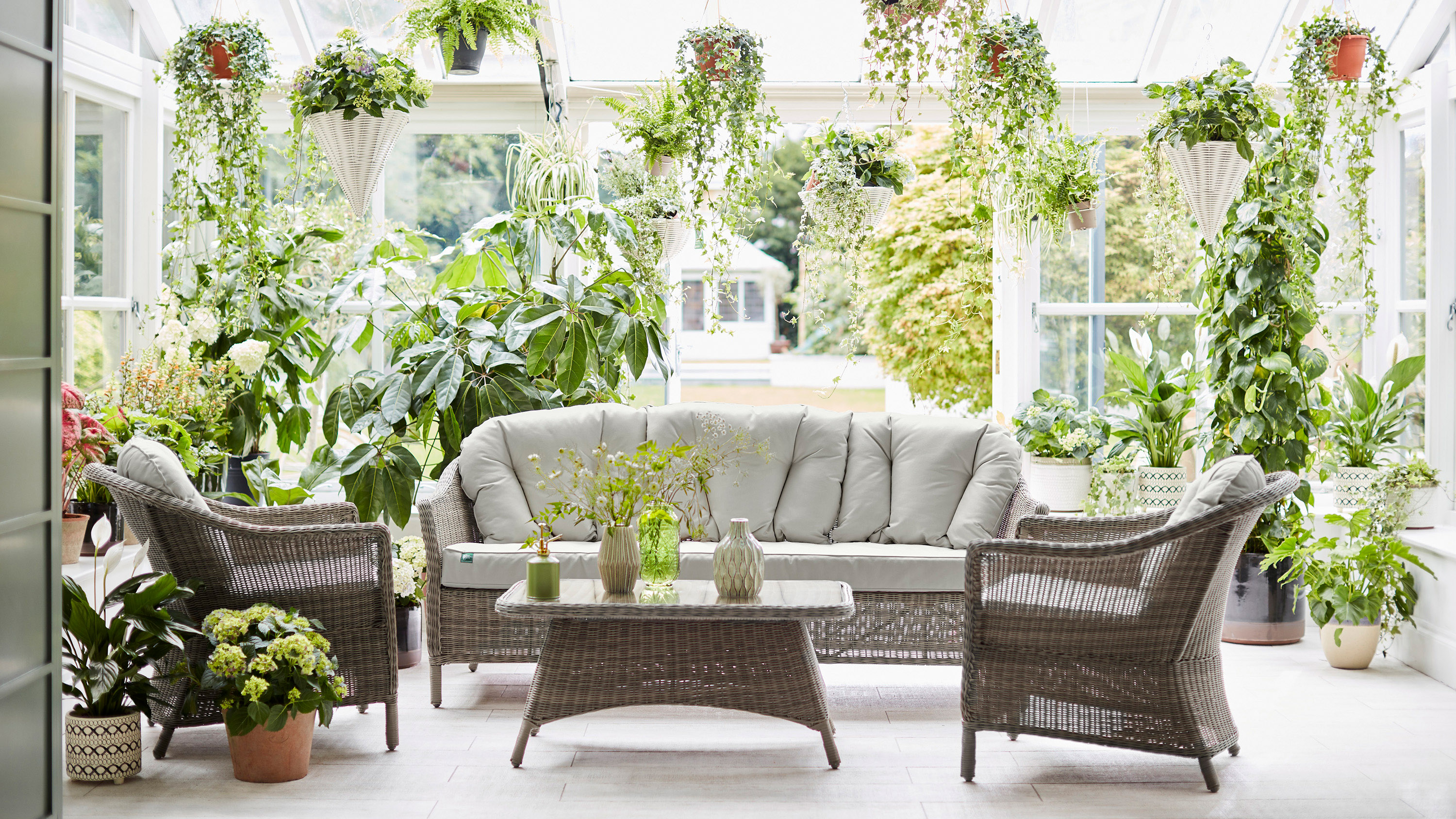

Indoor plant ideas can help lower stress levels, replenish the air and make your home look gorgeous. What’s more, indoor plants offer an excuse to have fun and get hands-on creative too.
Surrounding ourselves with indoor garden ideas, and the act of caring for plants, also helps us get back in touch with nature. And, as the Botanical Boys say, 'Connection to the natural world is more crucial than ever. In a fast-paced fragile world we live in today, we need to just slow down sometimes and observe nature – it's the one thing that keeps us alive.'
'It is incredibly important that each and every one of us finds the time to connect to nature in some way and by doing so also positively impacts our own wellbeing,' they add.
It's easy to enjoy all the benefits of plants indoors. However big or small your home, there's definitely room for a leafy beauty or two – from tiny bonsais to stately palms and figs they can pep up a mantlepiece, filter light coming through a window or even help divide an open-plan living space. They can add contrast and texture to the simplest decor, turn a dull set of shelves into a stunning statement or add a stylish flourish to a new coffee table or kitchen island.
So keep reading to find out how you can transform your interior with these creative ideas.
1. Create a centrepiece with ferns
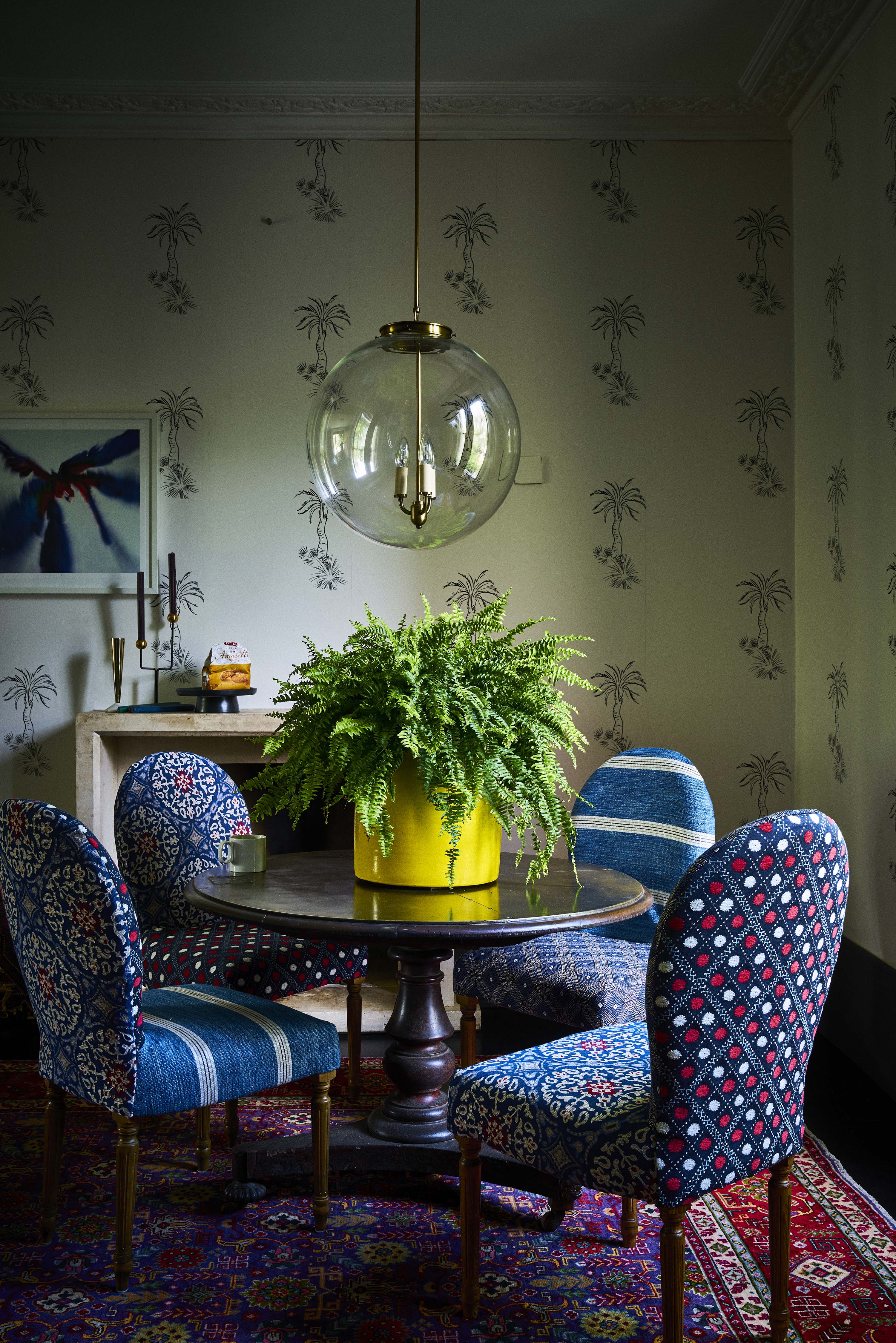
A potted fern makes a stunning focal point
Every dining table needs a beautiful centrepiece to elevate the ambience. This potted fern adds a vibrant pop of colour to an otherwise sumptuously dark-hued room.
It adds a simple yet striking feature that will make any dinner party, late brunch or simple work day's breakfast that little bit more special. It's no wonder ferns are seen as one of the best indoor plants right now. In terms of varieties to go for, the Boston fern is a popular and easy-to-care-for choice, but there are other stunning options such as the delicate maidenhair.
Take a look at our feature on Instagram’s most popular houseplants revealed for more stunning houseplants which are totally on-trend.
2. Plant up a picture
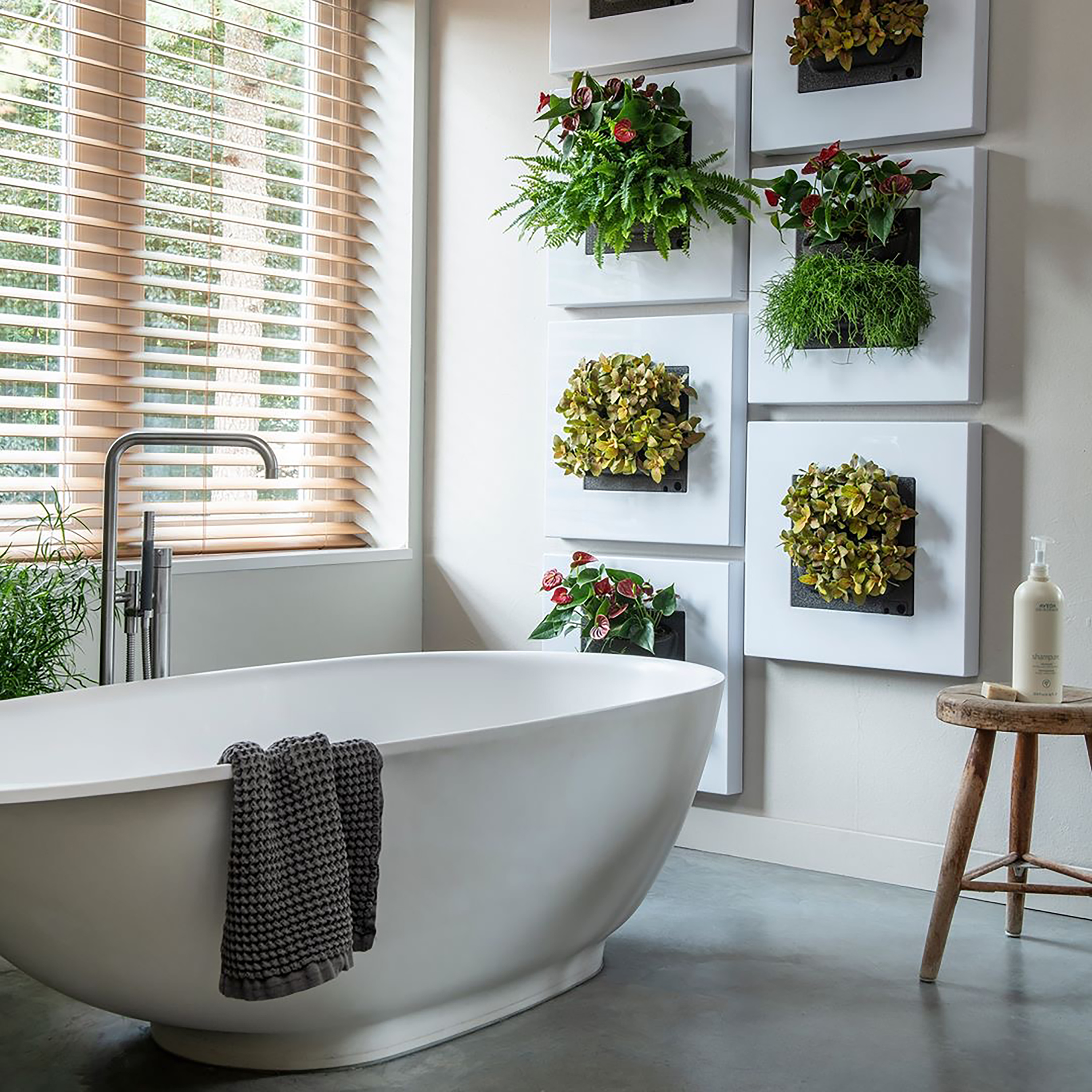
View plants from a different perspective by using them as living art. Perfect for pepping up a plain wall or bringing an organic touch to a functional space, these clever frames can house pairs of plants.
Position them tight together in rows or grids, where the plants will grow to hide their planting pockets, creating the look of a lush living wall – plants with similar leaf tones work best for this. Alternatively treat them as painterly masterpieces, by choosing striking, coloured foliage (try devil’s ivy and Philodendron) and spacing the frames evenly apart.
Want to create a similar effect on an outside wall? Our guide on how to create a stunning display of succulents in three easy steps will inspire you to give it a go.
3. Hang them up high
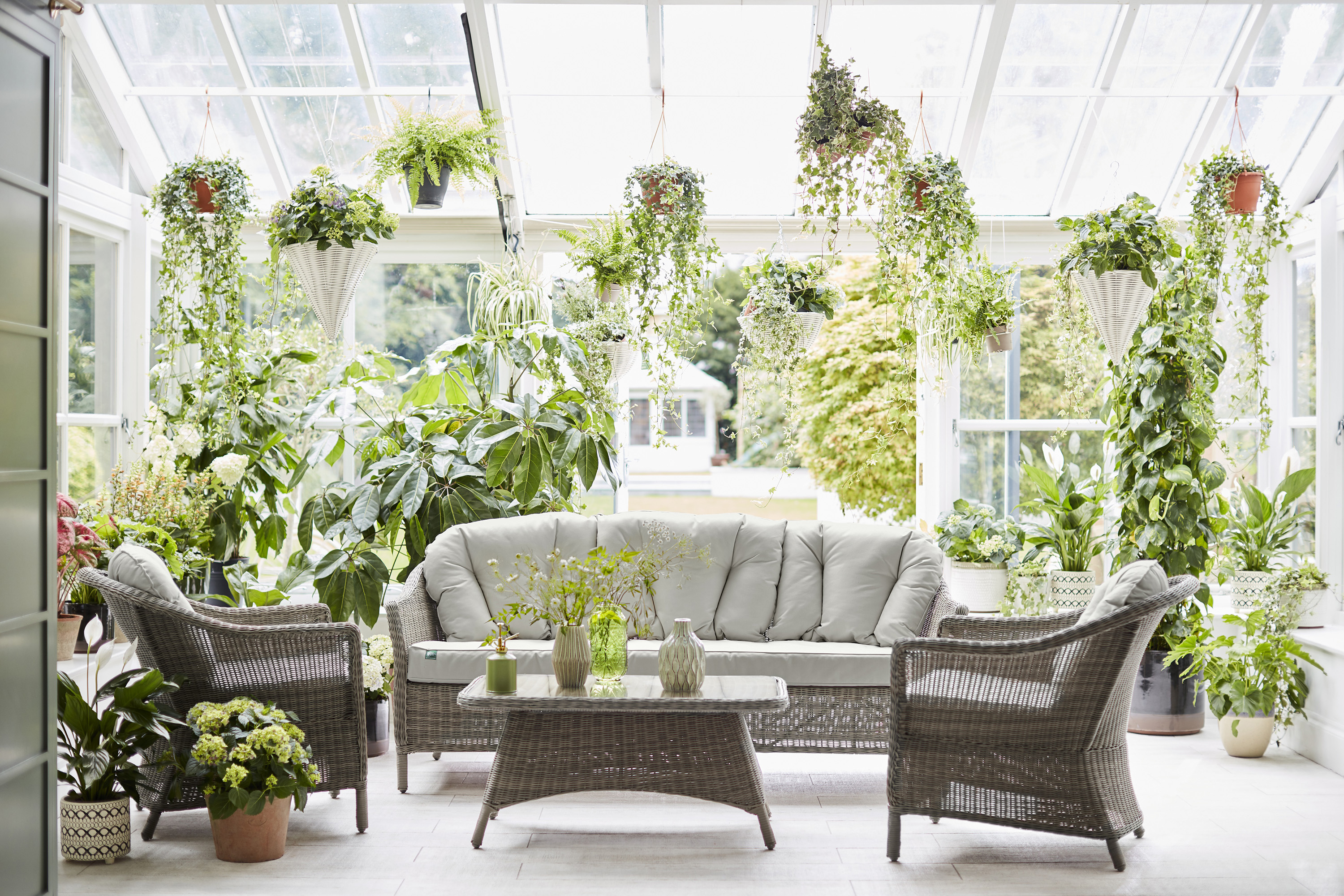
A plant-filled set-up from Dobbies
One for real plant lovers – if you've got the ceiling space, then now's the time to use it. We love how this conservatory brings the outside in with tons of fresh foliage.
Ferns and trailers provide a leafy canopy through the use of hanging containers and baskets, attached to the beams above. Meanwhile, larger plants in pots line the room's borders, framing the seating set-up.
The result? A revitalising colour palette of green tones and soft neutrals, which looks totally inviting.
4. Mix up your pots
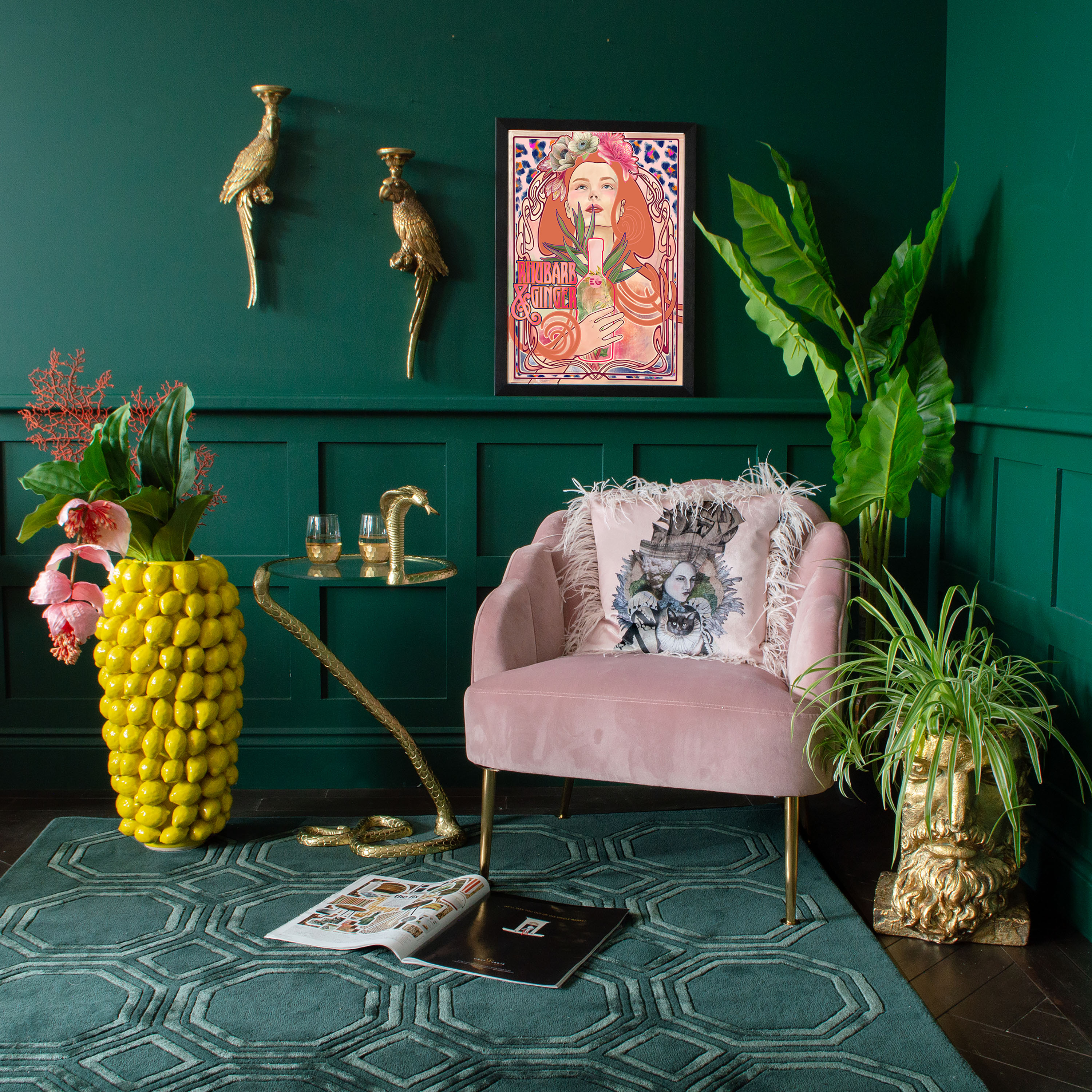
Set-up by AUDENZA
When it comes to pots for your plants, don't settle for the ordinary. It's easy to add a playful vibe to your space with bold colours and fun shapes.
This stunning vase to the left of this super-cool set-up is bound to turn heads with its bright yellow lemon design, whilst to the right, an ornate gold design sports an eye-catching spider plant hairdo. Designs like these are bound to make you and your guests smile.
5. Get creative with kokedamas
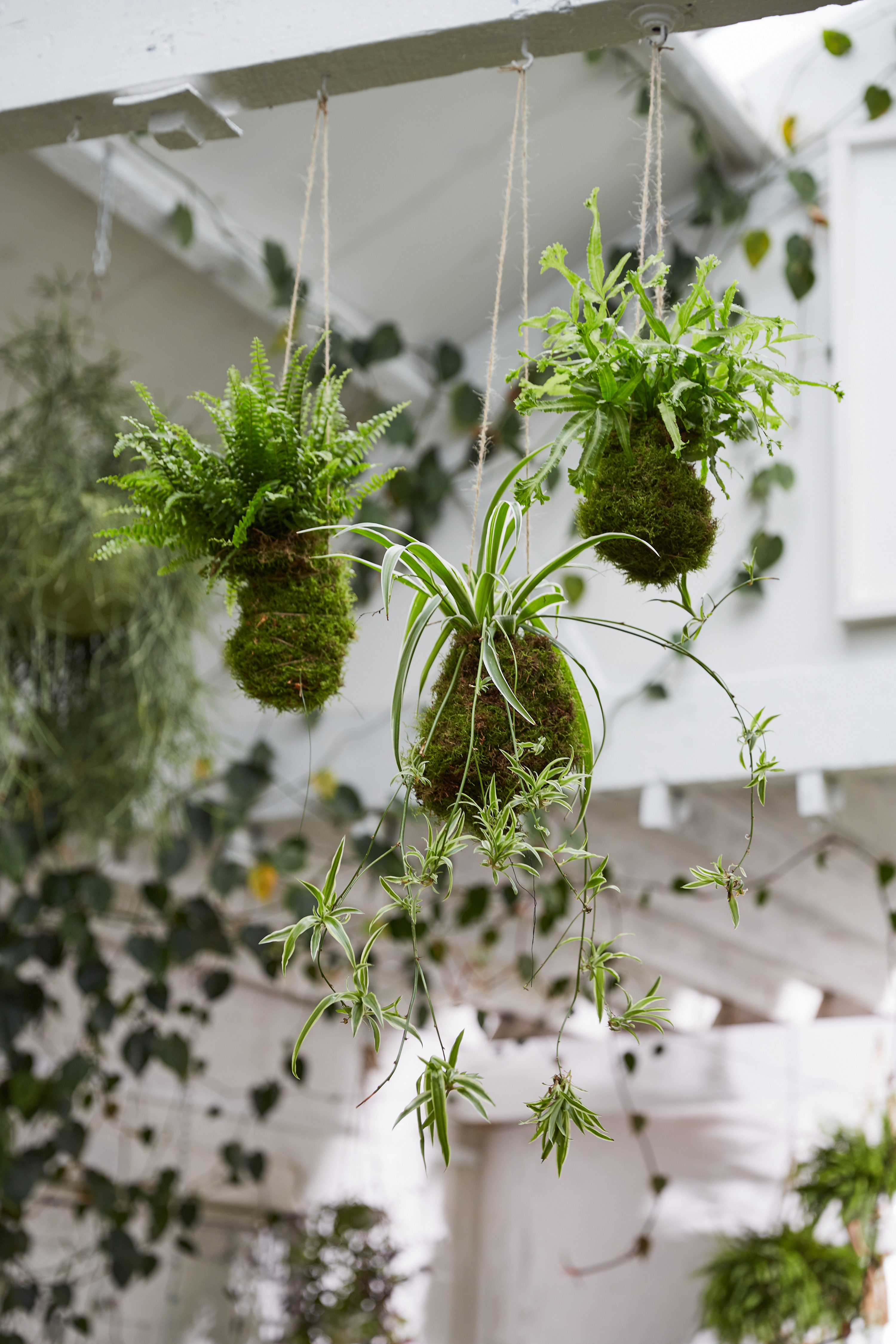
Kokedamas, meaning 'moss ball' are wonderful additions to the home
Kokedamas, meaning 'moss balls', are a Japanese creation that's taken the Western world by storm. They are created by wrapping roots in wet compost, then covering in moss and tying with string.
Hung up high, they make a beautiful and natural-looking treat for the eyes. The team at Gardeners' World suggest watering kokedamas by periodically dunking them in water, before hanging them up to dry. Spray with a mist-bottle in between, to keep moist.
Try using spider plants (you might then get baby ones as shown here – yay for free houseplants!), bird's nest ferns (for ruffled edges), or asparagus ferns (for ethereal wisps of green). If you love the Japanese style, then perhaps you'll like our small Japanese garden ideas, too.
6. Complement your wall colour with plants
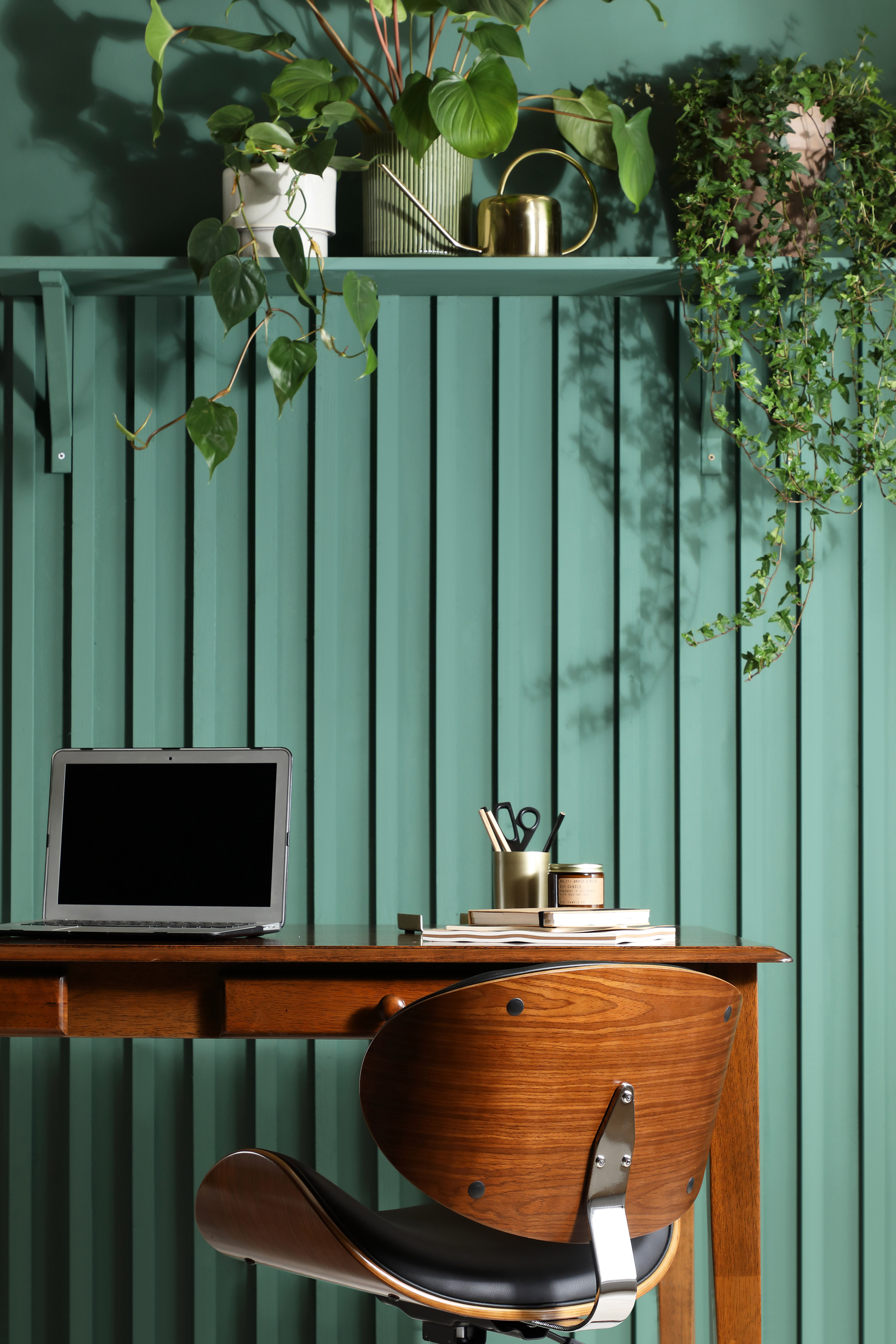
Pair blue-green walls with lush foliage
Work stress will never get to you again with this serene set-up! These pretty blue-green painted panels provide a beautiful background to this home-office space. And it looks even better with the addition of trailing plants on the high-up shelf, which complement the colour perfectly.
We especially love how they create subtle shadows, adding a sense of drama to the scene.
7. Go for an easy-care hanging display
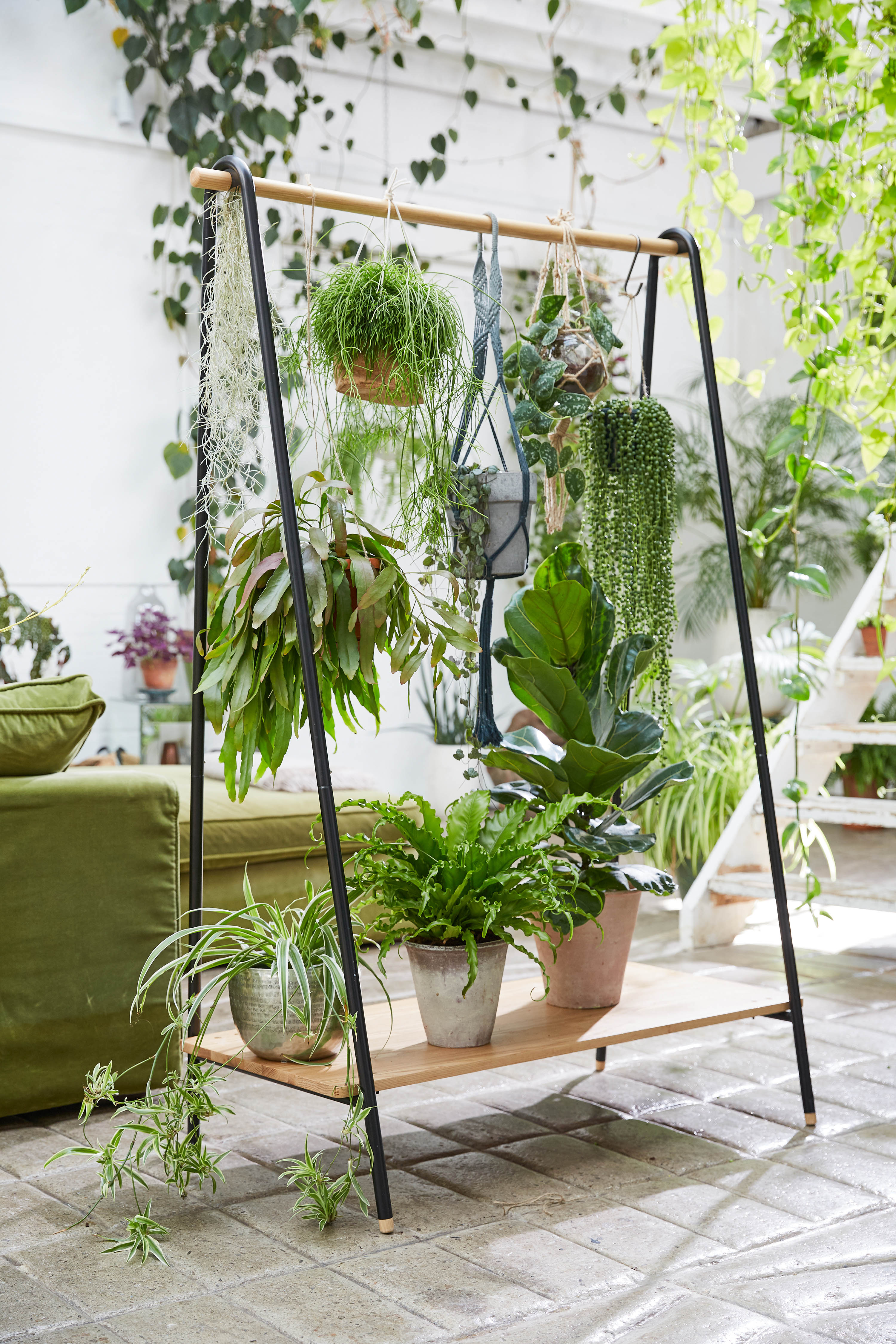
A simple yet effective way to create impact
Let the your plants do the talking – en masse – with a hanging display rail. A quick and easy way to make an impact with greenery, it will transform an alcove, blank wall or a less-than-lovely view in an instant.
Customise the finished look to suit your space by varying your plants. Rows of compact, sun loving succulents such as houseleeks and Echeveria will create a chic, orderly vibe while a mix of large glossy leaved peace lily, ferns and trailing ivy conjure up a more tropical feel.
8. Liven up a hallway
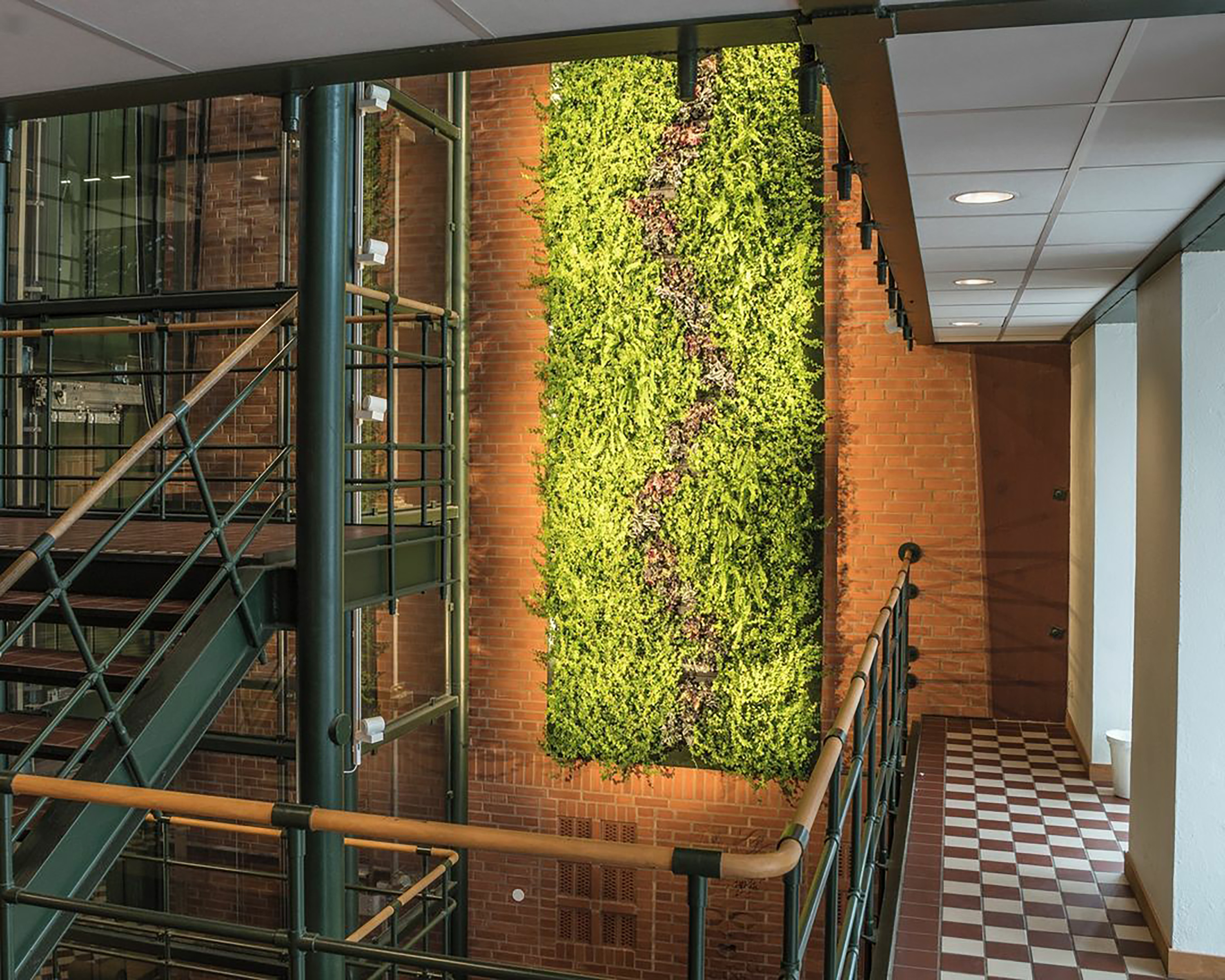
Make a statement in your hallway with a living wall – available from Botanical Boys
Add a touch of calm and grandeur to a busy hallway or stairwell by going large. We love this big-impact living wall planter which instantly makes this space feel stylish.
A tall, potted plant popped on the floor in an empty corner is also a good option to unify an awkward space and make it feel much more welcoming. Look for shade lovers with large glossy leaves – such a Swiss cheese plant, dragon or corn plant – as these will reflect the light, add texture and tone and help to visually break up the sharp, angular lines of architraves, stairs and doorways.
9. Go high with an overhead planter
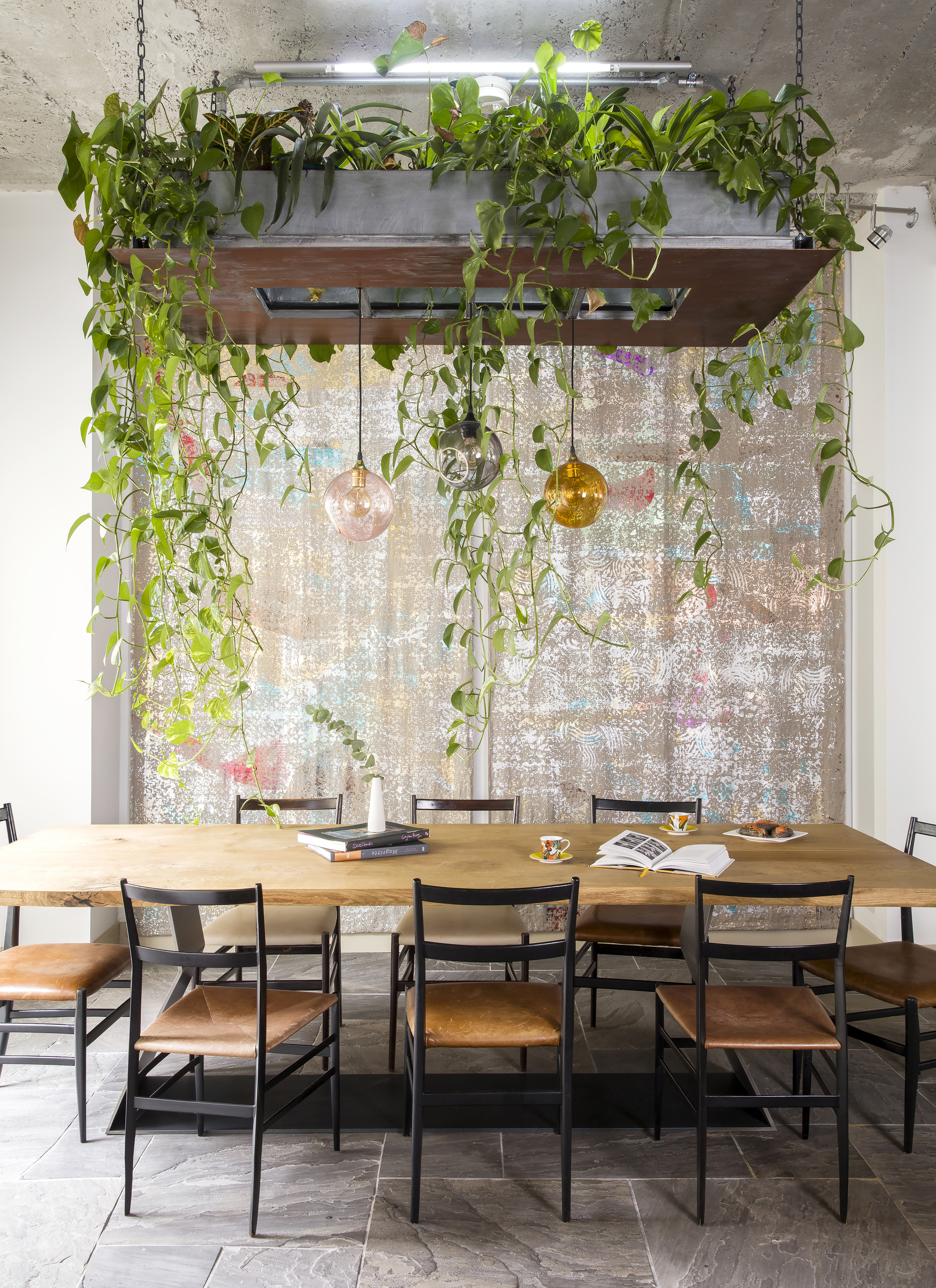
Go high with houseplants for instant appeal – Project designed and installed by Room
Let hanging plants do what they do best, by growing them in an overhead suspended planter. This bespoke steel beauty from a project by interior designer Nina Cooley features trailing Tradescantia and devil’s ivy.
Lit by daylight bulbs installed in the ceiling, it also incorporates a trio of glass pendant lights from Design By Us. The effect is truly magical when they are lit.
10. Brighten the space with bulbs
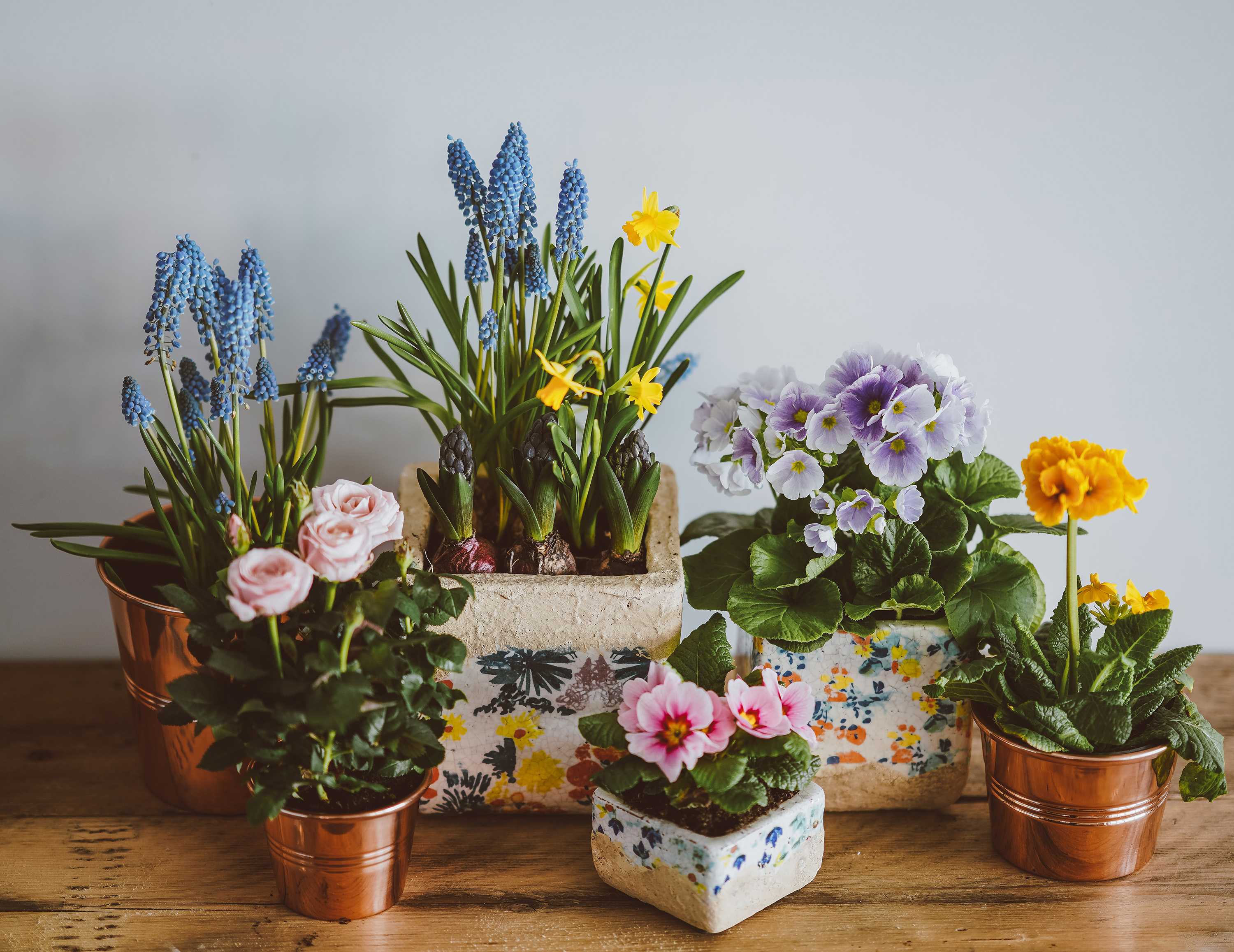
Indoor bulbs are a lovely way to bring spring indoors
If you're after spring cheer, why not bring in some bulbs? Planted in a jumble of colourful pots and placed around the home, they will brighten even a grey day with their positive vibes.
Try favourites such as Narcissus, hyacinth. Not only do they look stunning, they will offer a beautiful fragrance too. Head over to our guide on how to force bulbs indoors for advice on how to get started.
11. Try a Bonsai
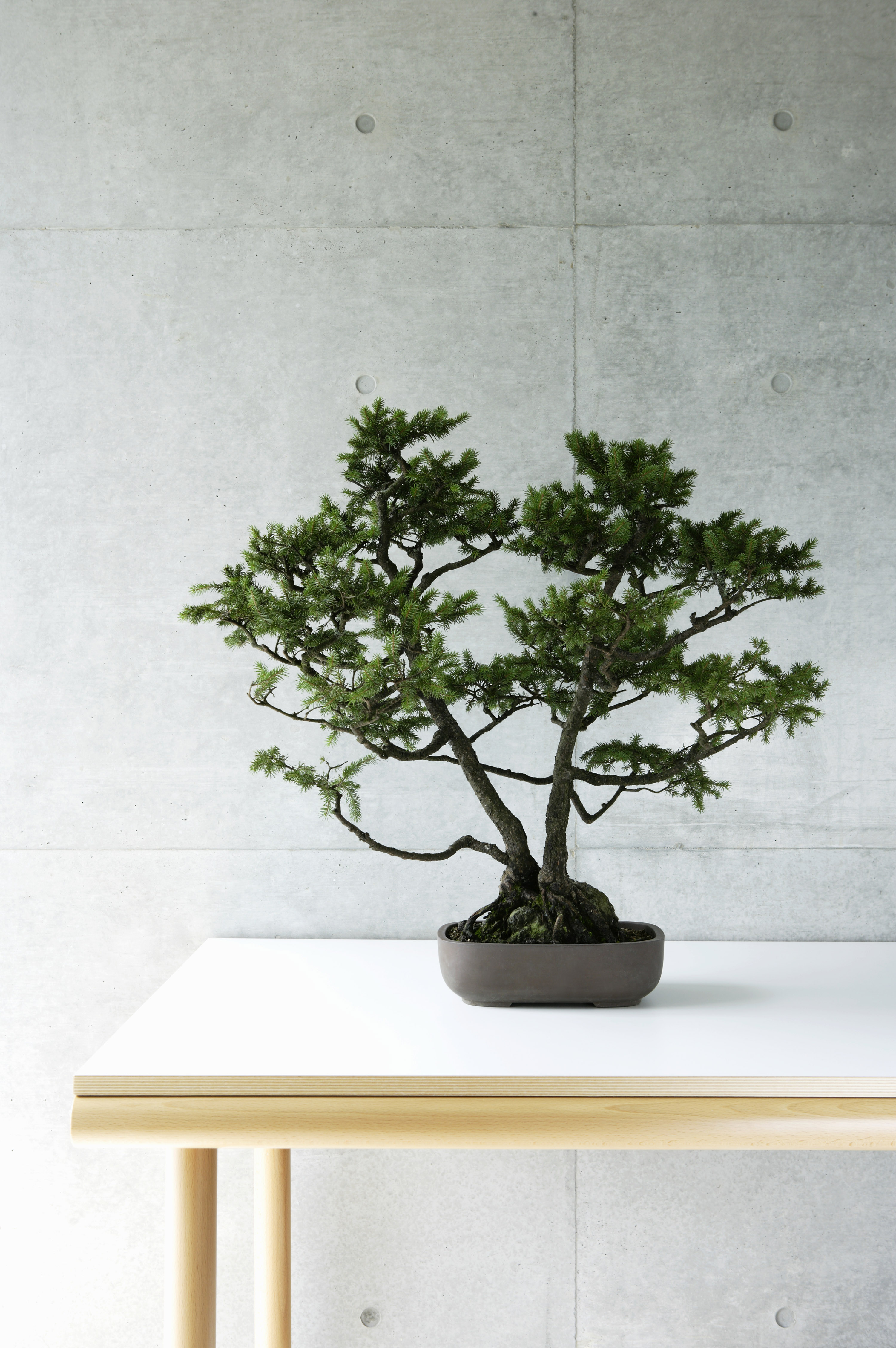
Miniature trees create a magical feel
If you love minimal style, then a lovingly tended bonsai could be your perfect, leafy fit. Meticulously tended their intricate shapes and textures look stunning displayed in an alcove or centre-stage on a coffee table, against a simple and well-ordered backdrop.
Detailed and intricate, varieties such as juniper, yew and pine are great for beginners as they are slow growing and will tolerate different environments.
12. Design a leafy divider
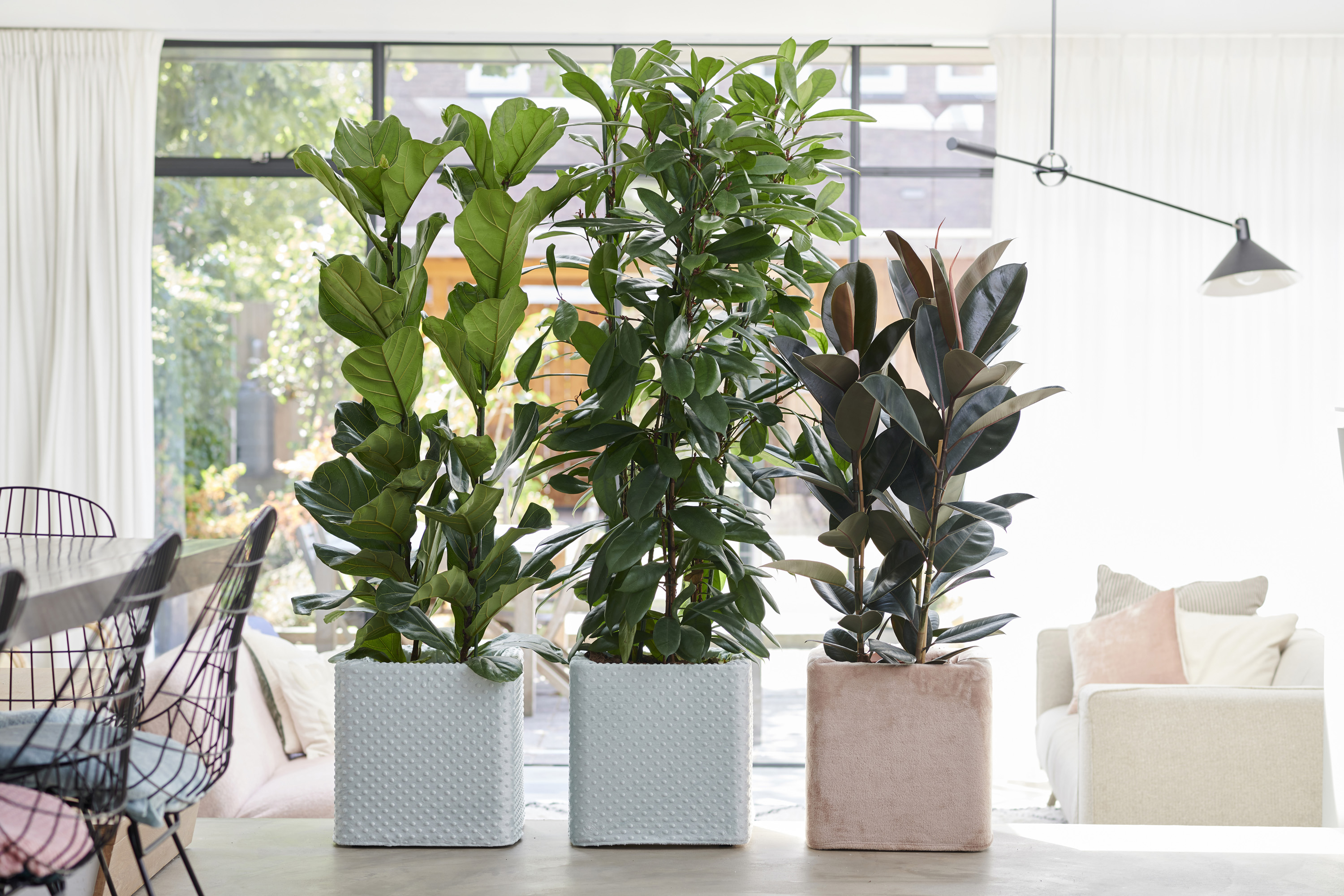
Three potted plants make a natural screen
Need to cosy up or zone an open-plan living space? Then try using a group of large container plants as a divider. Not only do they look great pulled close together, with their varying leaf shapes, colours and markings, these tall beauties will also let the daylight gently filter through to the different parts of the room.
Look for upright, multi-stemmed types of Ficus, such as the large leaved banjo fig, glossy leaved java fig or the iconic rubber plant Ficus elastica, and go for square planters to create a neat, space-efficient barrier.
13. Give shelves a lift
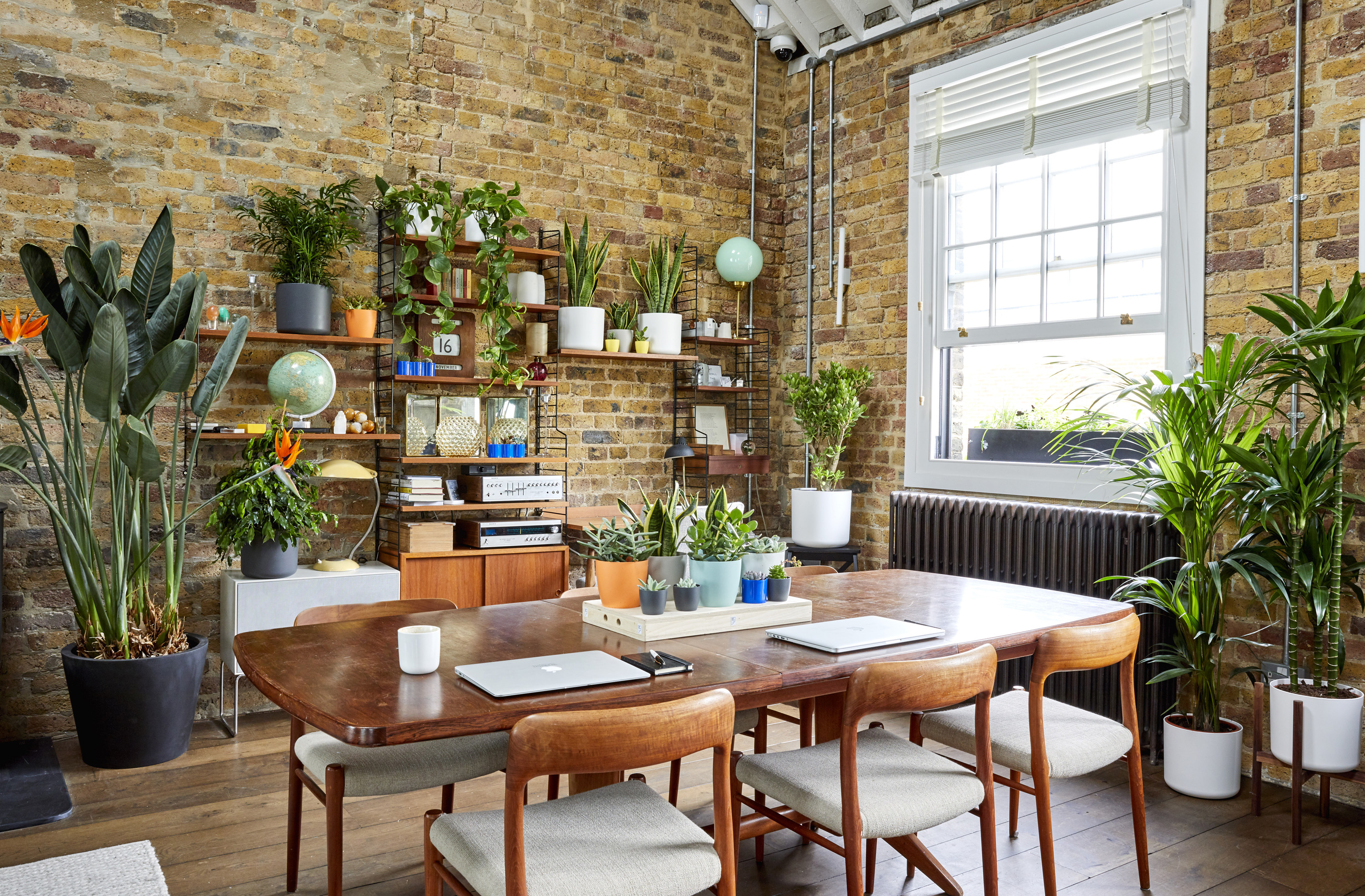
Great for storage and for making the most of wall space, shelving units are also perfect display opportunities for plants. Bring shelves to life by mixing plants of different shapes and sizes; choose from upright, trailing and small potted beauties – there are plenty of options to try.
Give your display a true designer edge by sticking to a few simple tips. Go for similar shaped pots in a single colour for a unified look. Pop trailing species on higher shelves so they have plenty of space to tumble down.
Upright beauties such as mother-in-law's tongue need lots of height but ensure they keep within the overall shelving 'grid' to maximise impact and to stop them from looking untidy.
14. Cultivate a terrarium
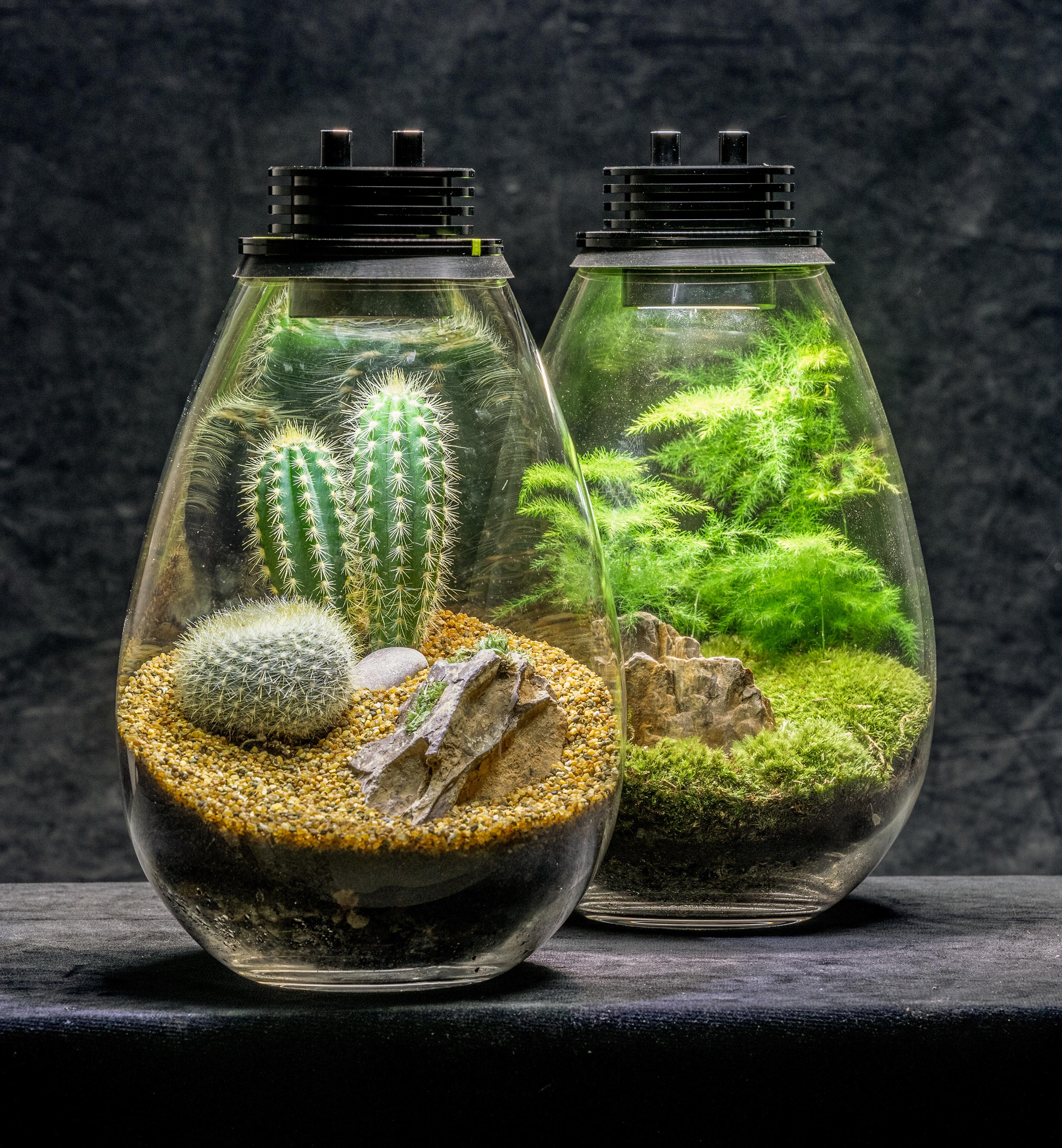
Lower your stress levels and lose yourself in a mini landscape. Filled with the intricate and mesmerising shapes of tiny succulents and air plants, and dotted with gravel and pebbles, a terrarium can become a calming and absorbing feature.
Place it in full view – on a coffee or side table – so you can sit back with a quiet cuppa and admire. To keep air-loving succulents happy, look for a glass dome or lantern with an open top or side to ensure plenty of ventilation.
15. Highlight a true beauty
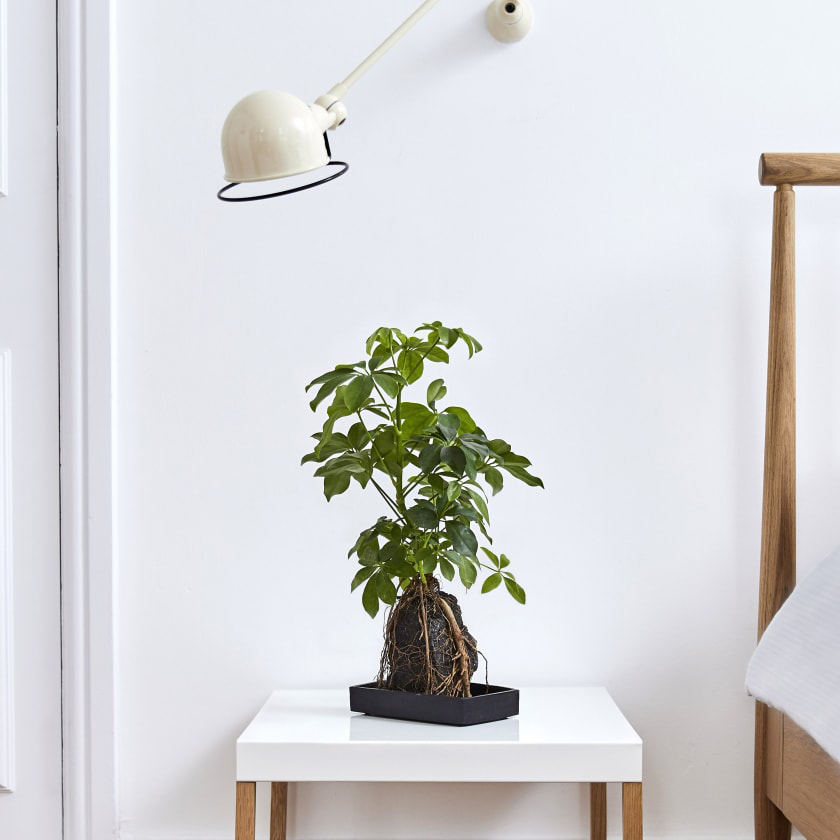
Sometimes a simple statement says more – so be brave a give a stunning plant the space it deserves. Look for a plant with a distinctive shape or unusual feature and pop it centre-stage on a side table or stool.
Keep the surrounding area clear and highlight with a well-placed spotlight or downlighter. The roots of this exquisite Schefflera have been trained around a lava rock and will lend a zen style feel to any room.
16. Create a hanging display
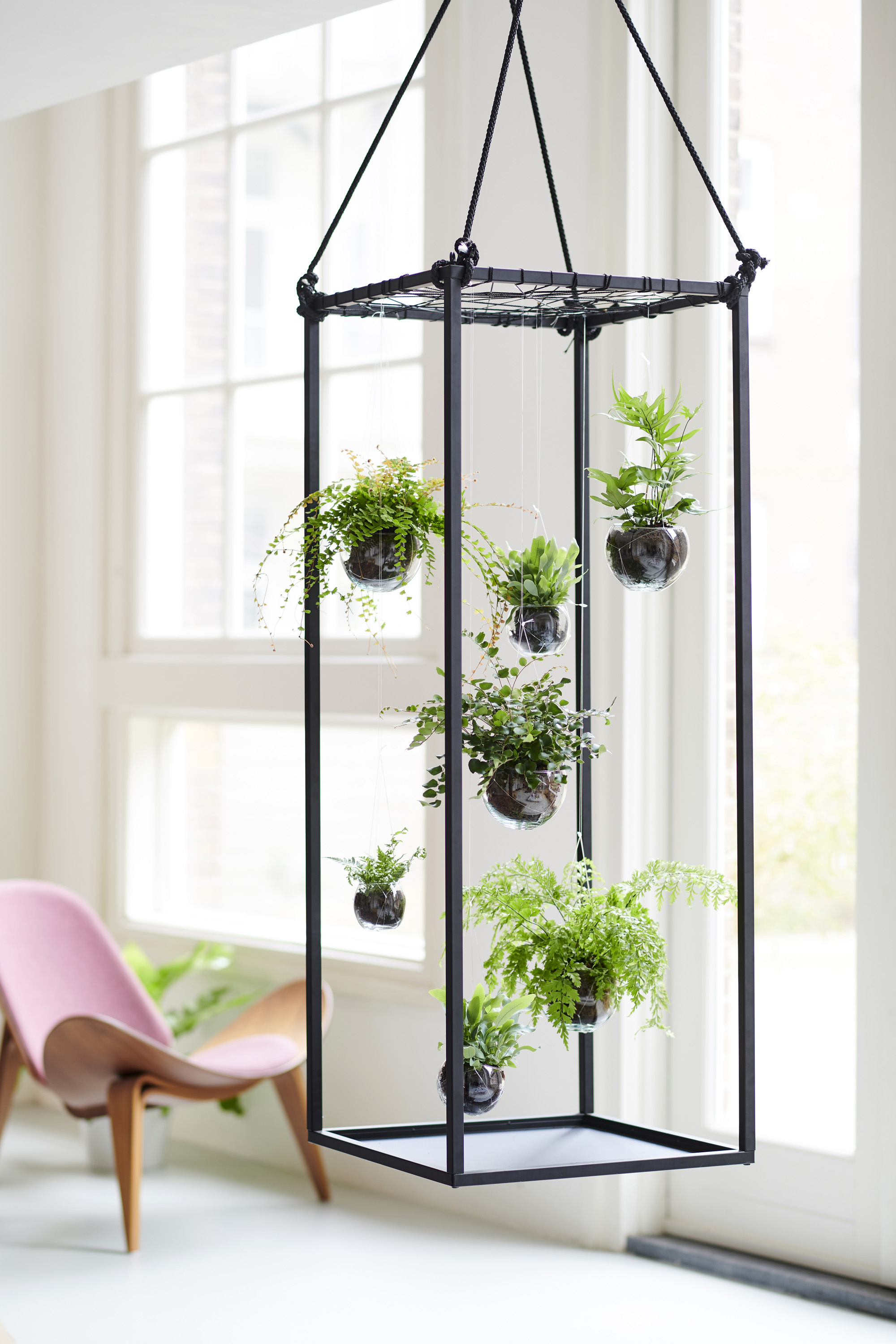
Create a sculptural plant feature for your home
Fancy something a little different? Then gather some trailing plants together and make a feature of them. Show off their delicate shapes and foliage by hanging them in front of a window or in a light or stairwell.
Choose simple, barely-there glass globe planters from Amazon and suspend them from a hanging pan rack (try Wayfair). If you fancy something more dramatic why not frame them within a metal plant stand with an added wire grid.
17. Show off trailing beauties
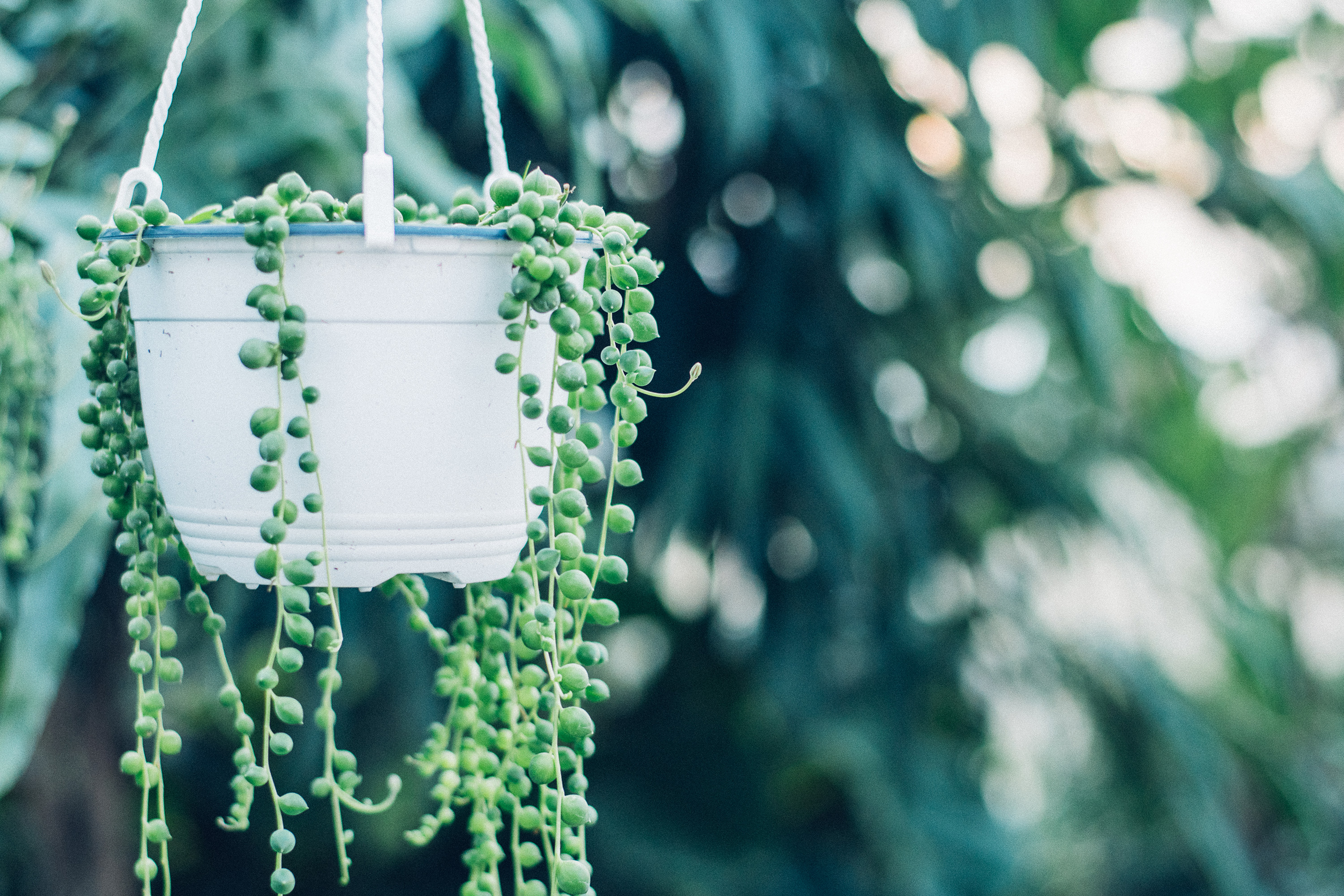
The beautiful string-of-pearls plant is a wonderful trailer
Okay, it sounds pretty obvious, but trailing plants look best when they have space to, well, trail.
Pop them on a high shelf, overhanging a mantlepiece or even on a high stool or side table all of their own so they can overspill their containers and charm with their graceful and often unusual forms.
Plant them in pots that are taller than they are wide to accentuate the tumbling shape.
18. Display on different levels
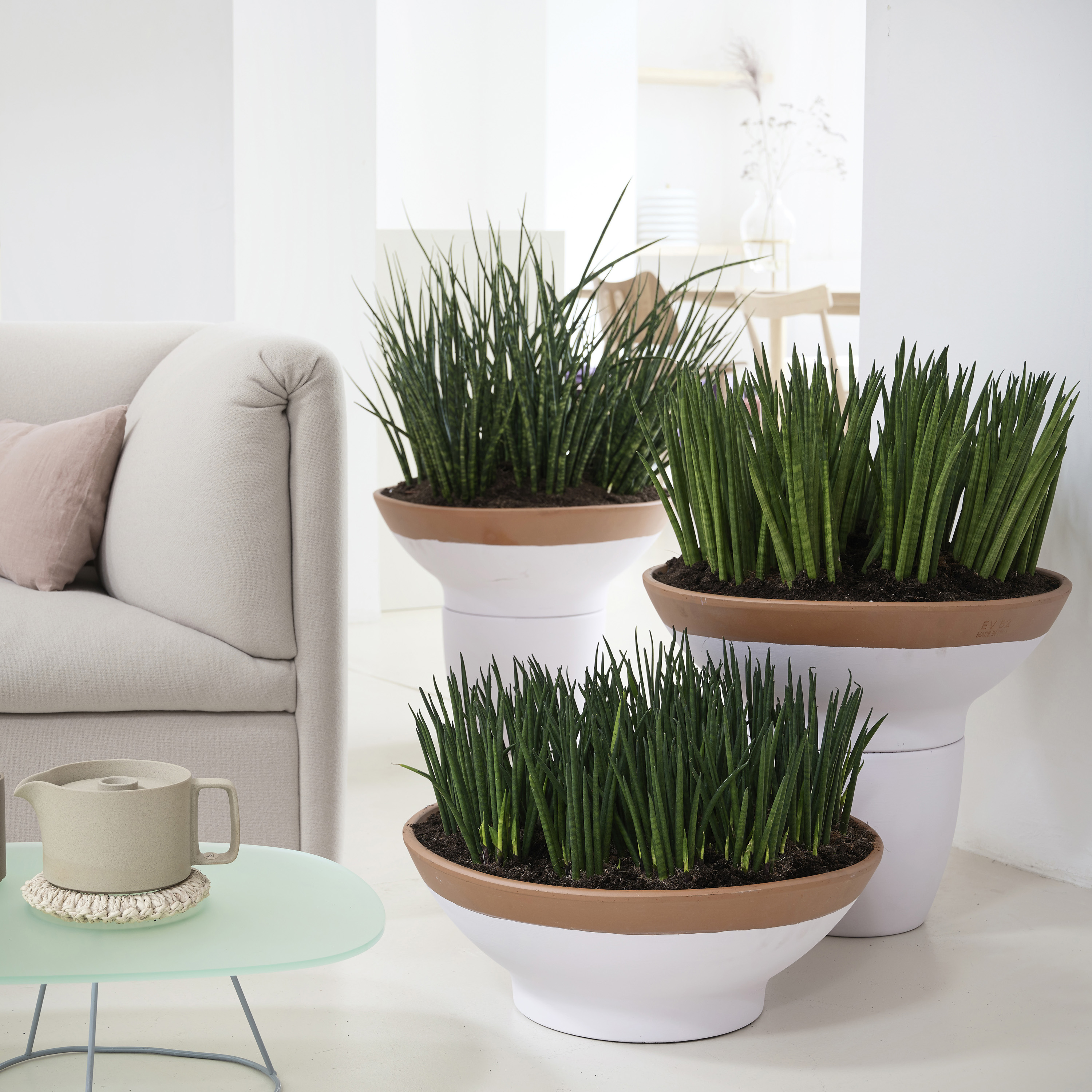
Use different heights to display your plants
Cosy up an empty living room corner with a tall trio of plants. Great for filling an empty corner or awkward gap between seating, it will bring an element of greenery to the decor and add a sculptural element too.
Create the effect by either choosing three different varieties of staggered heights. Or, repeat the same plant type in each container and use the planters to give extra height.
Look for container sets that come in varying heights or alternatively use additional up-turned pots as plinths, to create a tiered effect. Vertical species such as horsetail, Sansevieria or even cacti accentuate the look and add to the striking effect.
19. Nurture a living wall
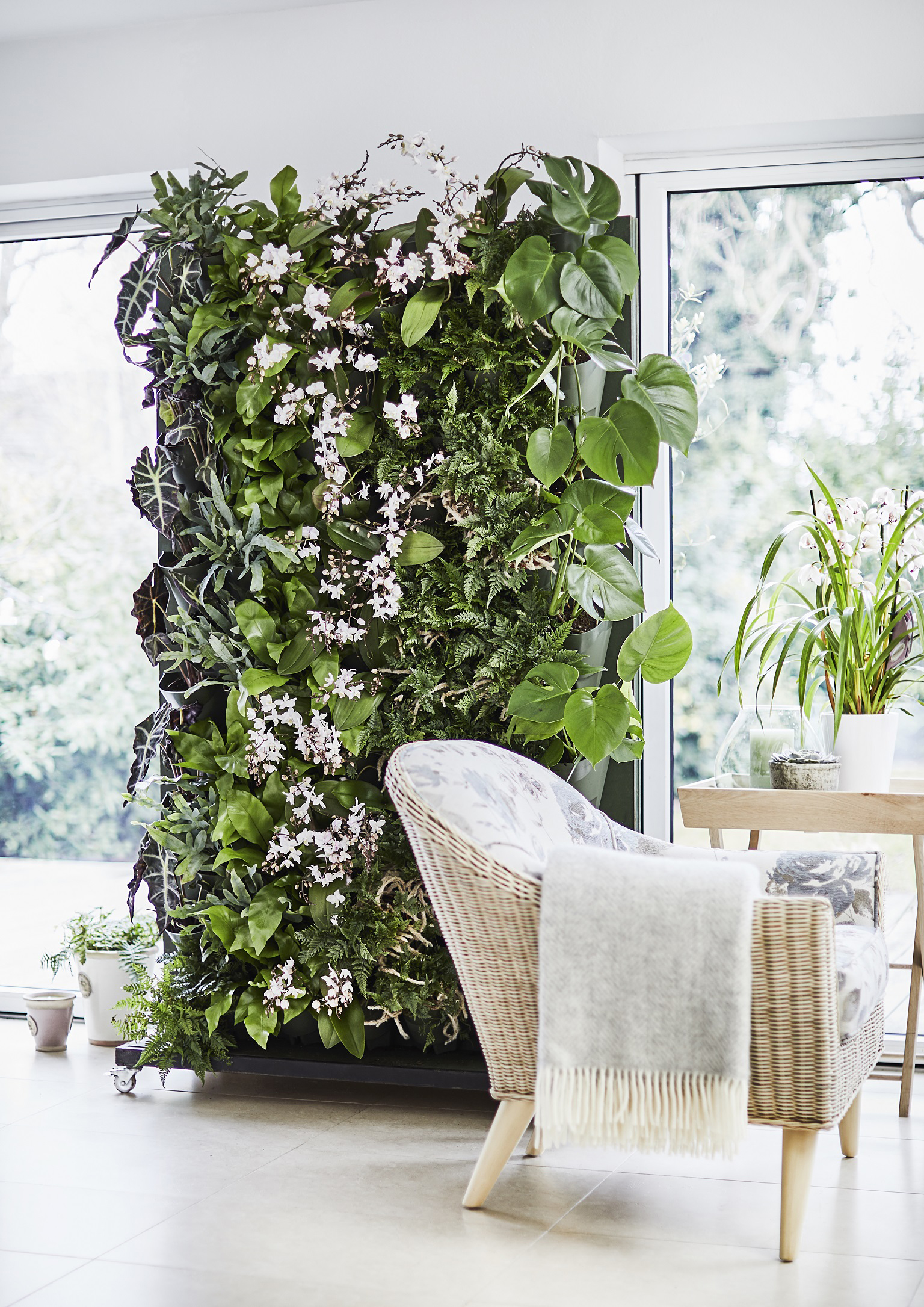
Go bold with a living wall
Create a spectacular feature in any room by planting a living wall. Closely packed together to hide the growing system, these dramatic walls of foliage will grab anyone's attention and introduce a mass of contrasting and textured foliage.
They do need a regular attention to keep them in tip top condition, but the overall result is well worth the effort. Plant specialists can help design and create installations with appropriate plant species but there are also DIY systems available that you can plant up yourself.
20. Plant a sculptural feature
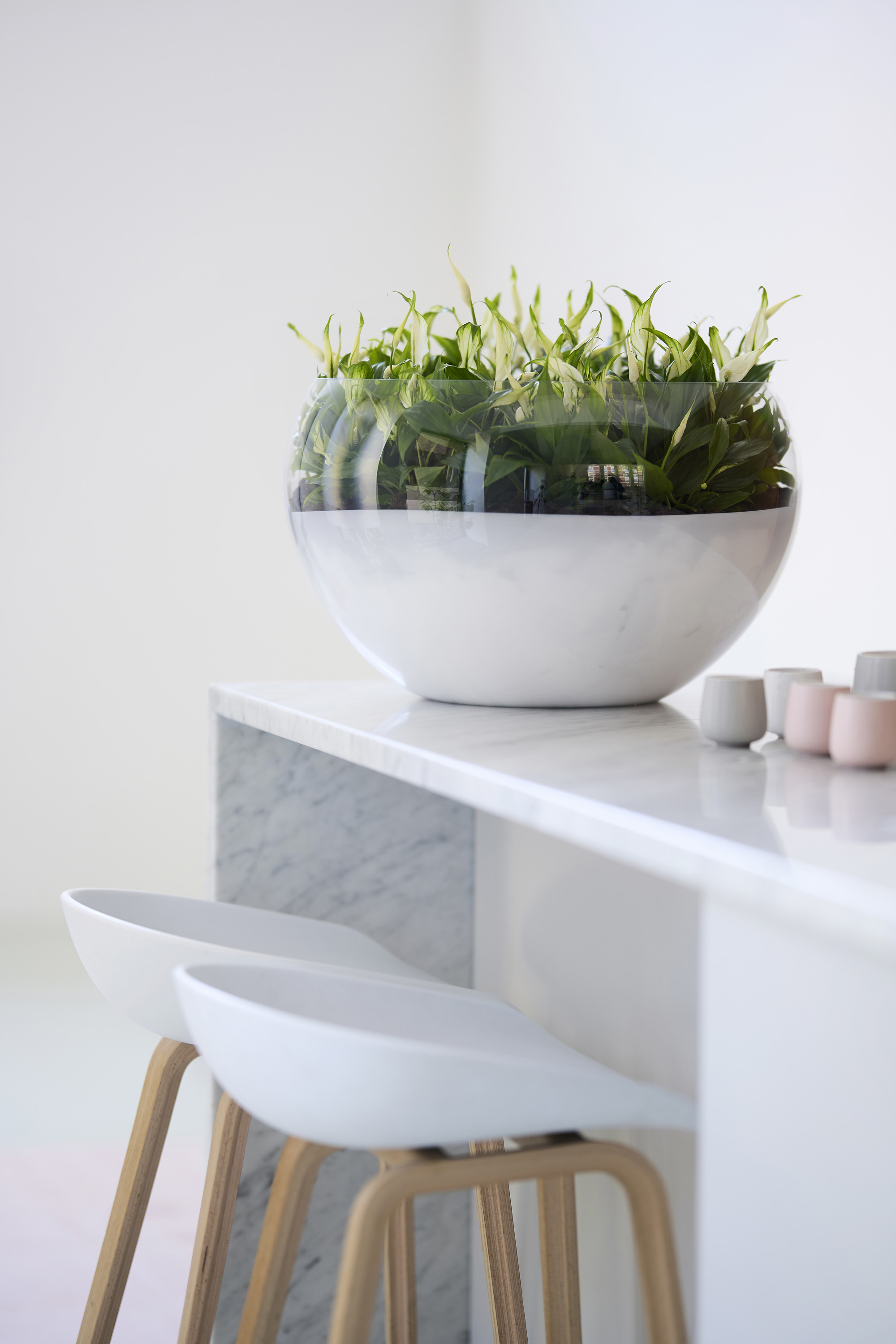
This large bowl-shaped container adds to a contemporary vibe
Want to add instant boutique style to a room? Then look for a boldly shaped container that you can fill with plants. An easy way to add impact to a prominent spot such as a kitchen island or sideboard, you can tailor the look to complement your decor.
For best results opt for a large and simple, smooth sided pot or vase – this will create a bold, contemporary silhouette – and plant up with several of the same single plant.
A compact, low-growing variety such as a miniature peace lily looks lush (which also benefit from being low light houseplants). Maidenhair ferns will create a delicate effect but also consider carnivorous pitcher plants for a real conversation piece.
21. Play with shapes
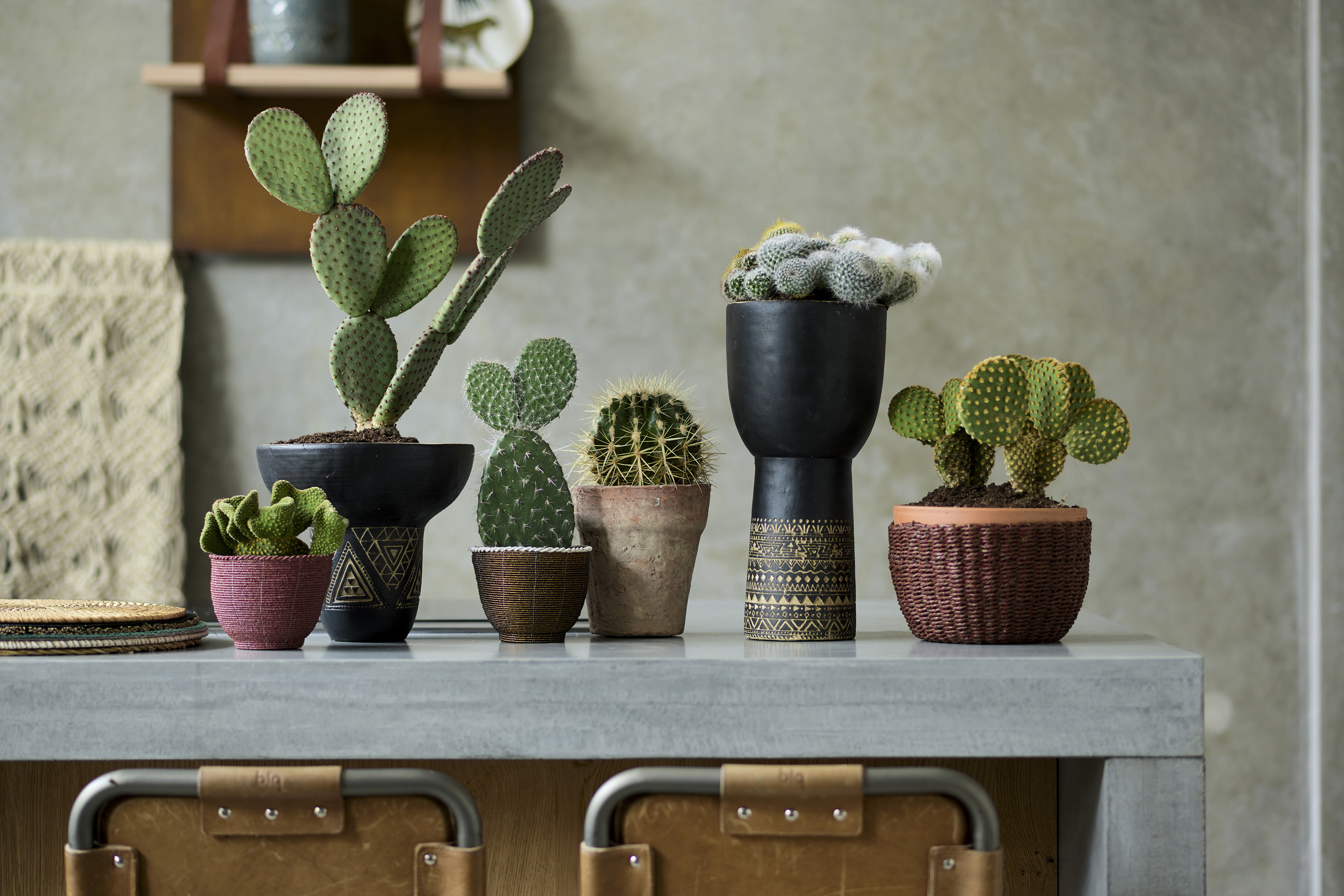
You can have tons of fun mix and matching cacti
Using plants to make an impact in the home is very much down to how they are displayed. Yes, the right plant needs to be in the right place to thrive, but it also needs to fit the room and its decor.
Eye-level view plays a huge part in this so think carefully about how to show off your plants best side. A row of knobbly, bulbous cacti looks fantastically quirky all lined up at eye level on a mantelpiece, shelf or console table.
Vary the heights, go for characterful pots and keep the background plain and simple for an eye-catching effect. Head over to our how to grow succulents guide for more plant growing advice
22. Add colourful foliage
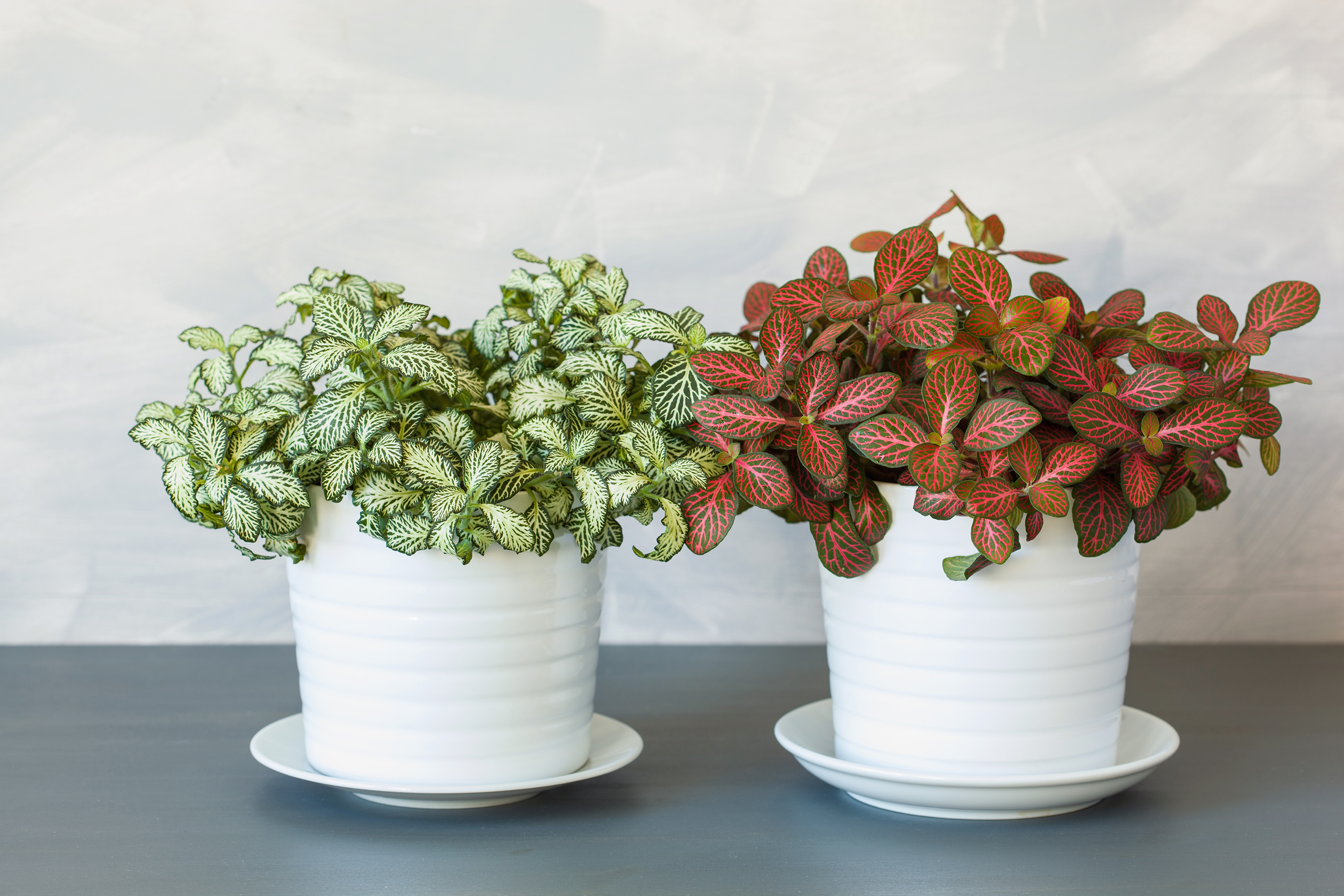
Fittonias add a pop of colourful pattern
Turn a low-level table-top, windowsill or shelf into a beautiful, living artwork with a group of carefully chosen foliage plants. By simply repeating a single plant type in all its colourful variations you can make a beautiful and unusual feature perfect for any room.
Look for low-growing varieties that have intricately patterned leaves – ivies, Tradescantia and these Fittonias all work really well.
Containers in neutral and mono tones work best, as these highlight the varying leaf colour. Arrange the plants in simple rows, rings, squares or rectangles as your space dictates, and sit back and enjoy watching your display thrive.
23. Try a no-soil grow
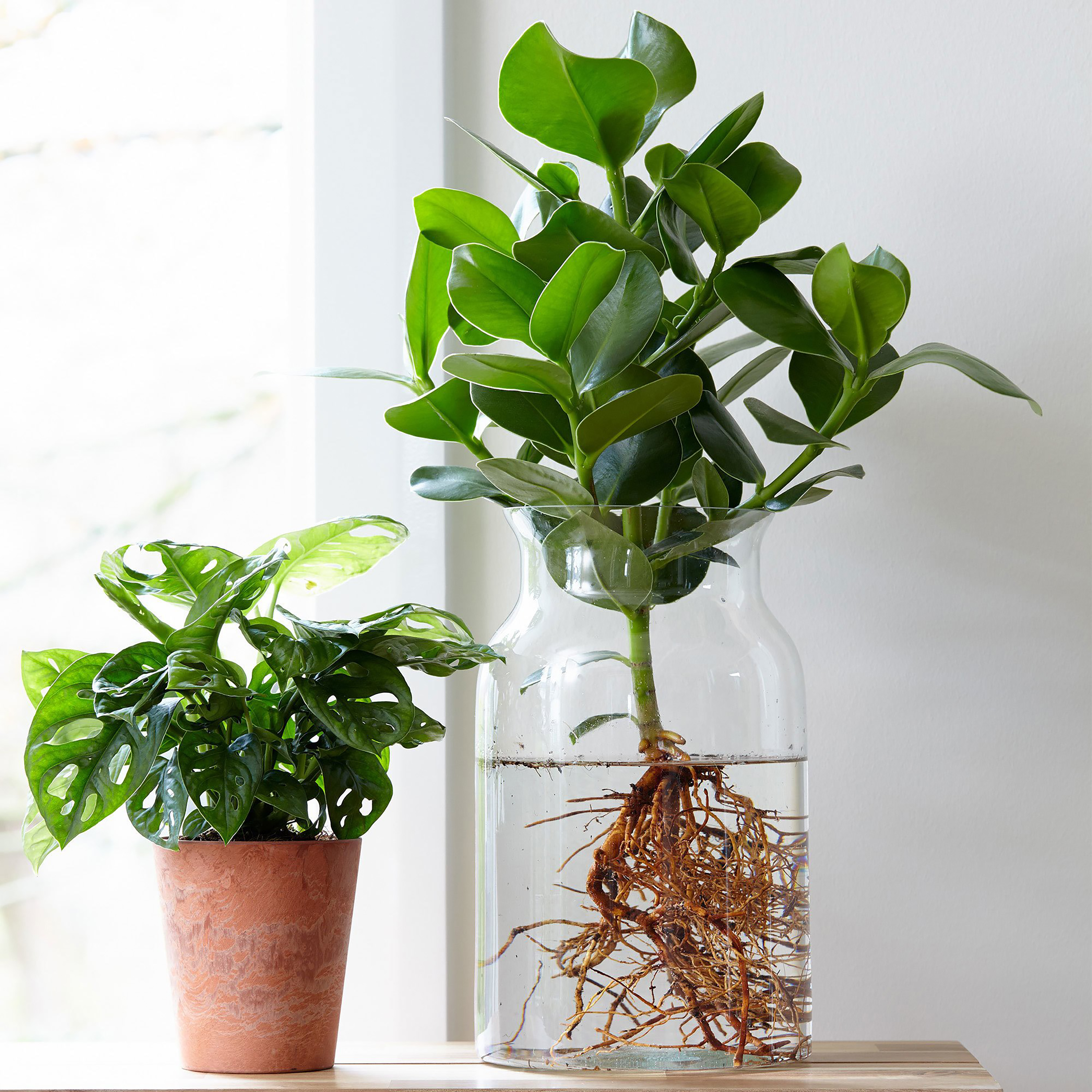
Clusia rosea 'Princess' (including glass jar), from Bakker
Raising plants in water is not a new concept, after all hydroponics have been around for the last 300 years, but they certainly make a spectacular design feature. Perfect for adding interest to a mantlepiece, side table or bathroom shelf, they look chic and uber-contemporary and it's mesmerising to see how the roots develop.
Either pop a mature plant, washed free of its growing compost straight into a glass, water-filled jar or take a few leafy stems and watch the roots grow. Plants such as Philodendron, African violets, trailing Tradescantia and colourful Coleus will thrive, as will the Clusia rosea 'Princess' seen above.
Choose a bright spot, out of direct sunlight and change the water regularly. Using mineral water will prevent the glass from scaling.
24. Revitalise your bathroom
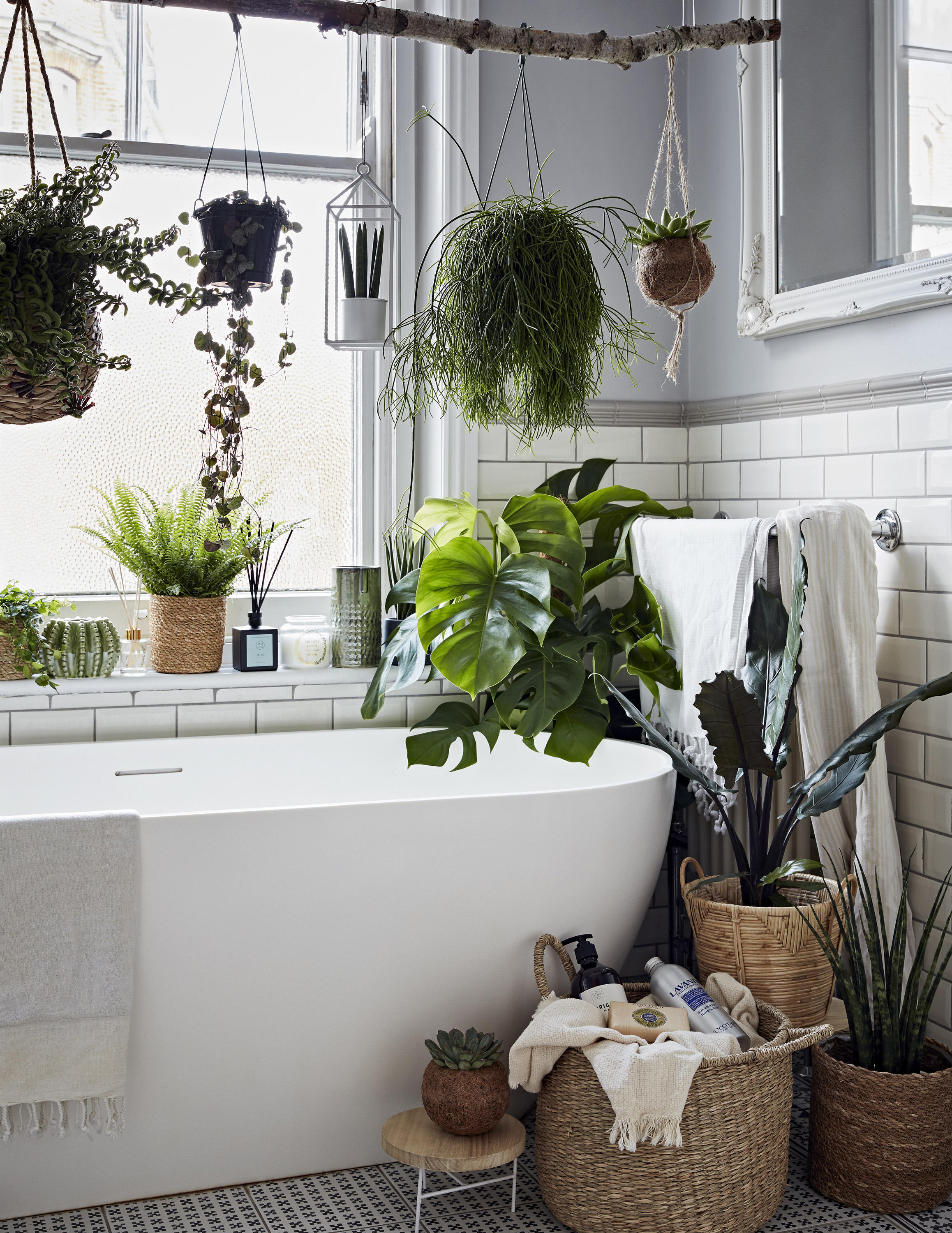
Indoor plants and accessories from Dobbies
Bathrooms are often light-filled and humid spots – the perfect habitat for indoor plants. Give your hard-edged and sterile room a leafy boost by packing it with leafy delights.
Many houseplants are small-scale treasures making it easy to pop them onto narrow windowsills, bath ledges and even around basins. A tall green giant will make bathing a more exotic experience while a hanging display above the bath adds a positively jungle-like vibe.
25. Create a plant gallery
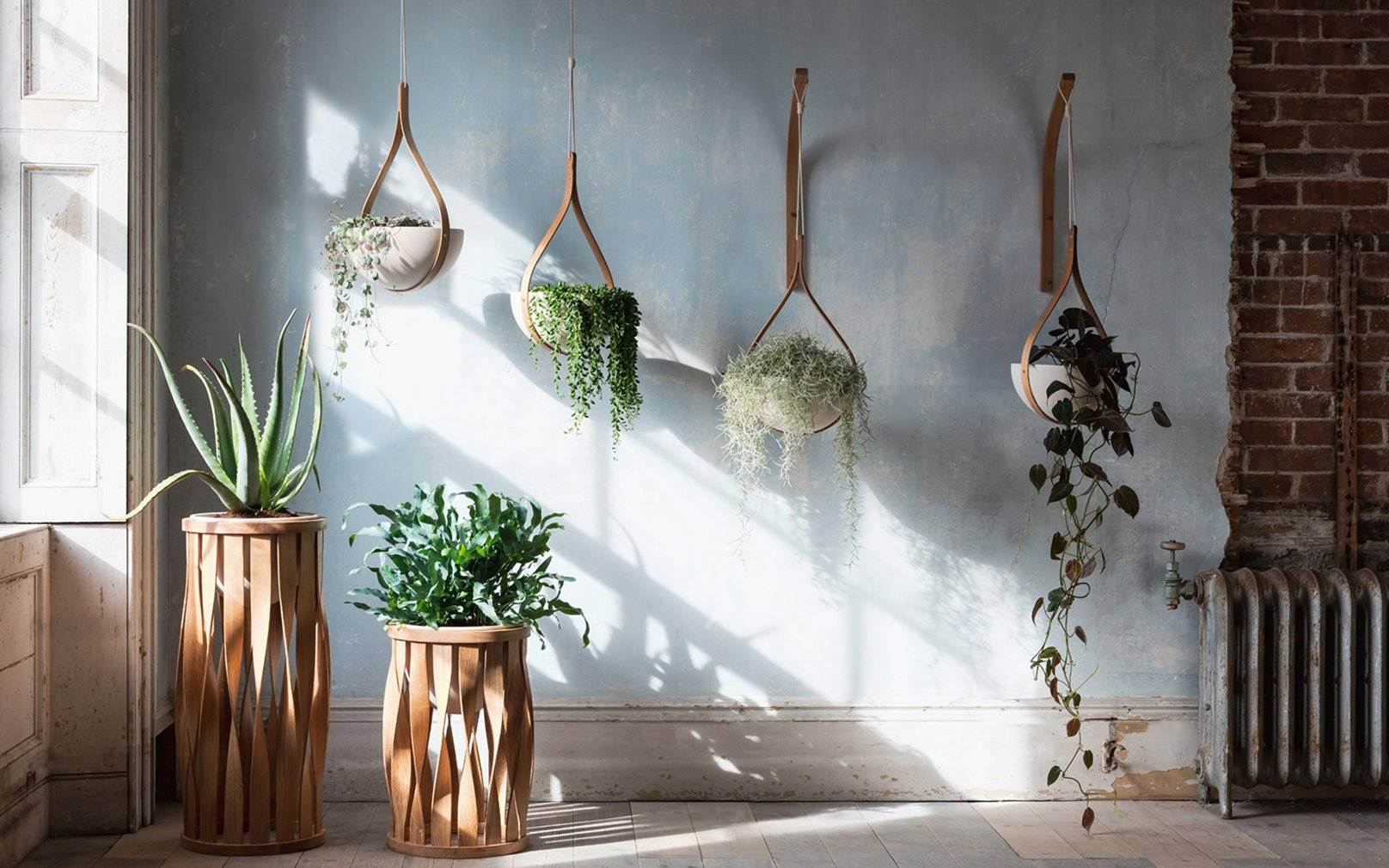
It's not just about the plants but how you display them, and if you are lucky enough to have a sunny corner, why not set up a gallery? Look for striking plant stands and hanging pots and arrange them in varying heights to fill the space.
A combination of floor-standing and hanging plants is a great way to create an informal feel that's full of interest. Mix up different leaf colours and shapes and encourage trailing plants to grow to one side so you can still see the outline of the container.
What is the best indoor plant to clean the air?
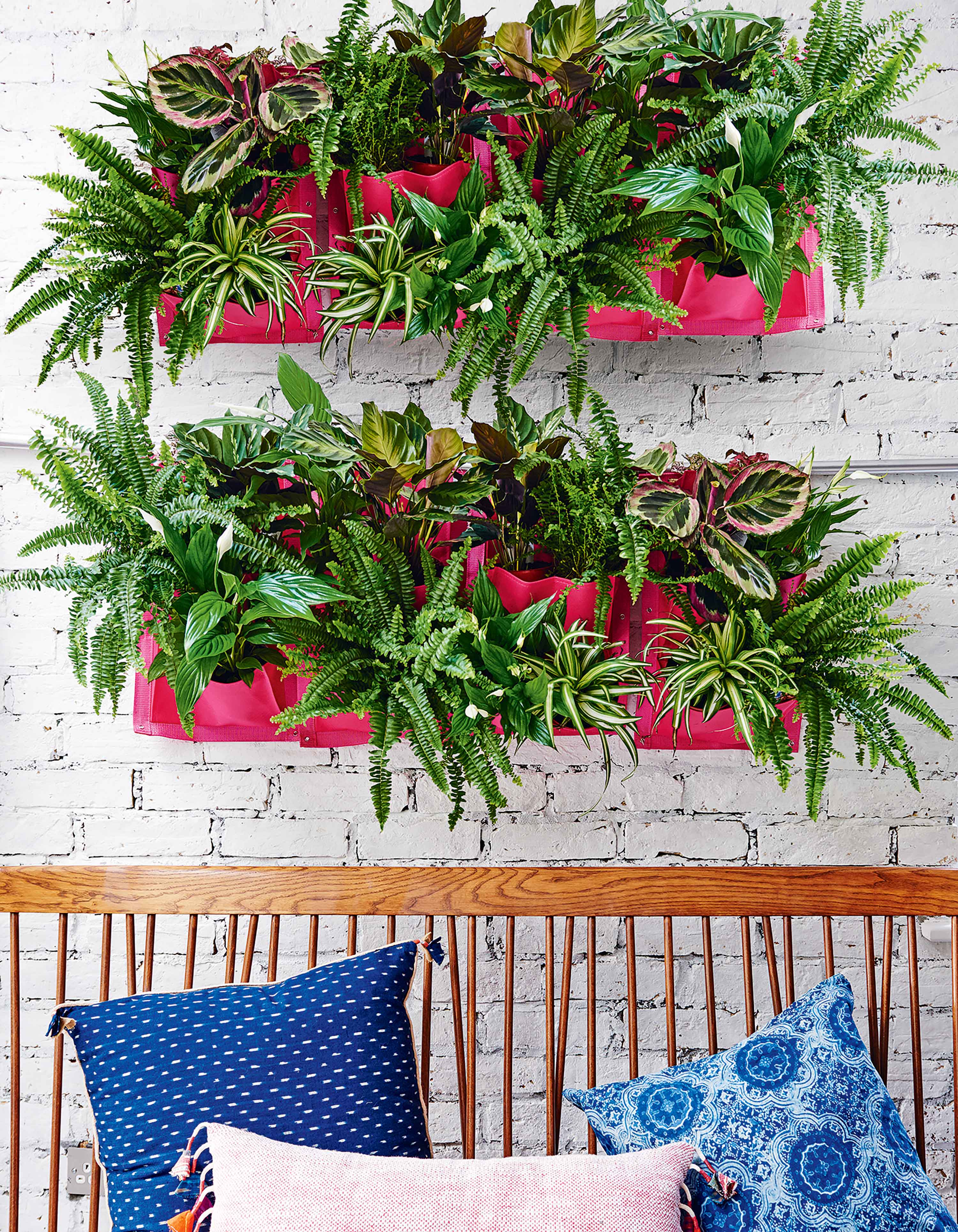
Plants don't just add style, they have health-benefits too
We've listed our favourite picks of the best indoor plants to clean the air below, as suggested by Healthline. See, plants don't just improve the aesthetics of your space, they improve your health too!
- Spider plants will eliminate formaldehyde and xylene and is super easy to look after.
- Devil's ivy will tackle toluene, formaldehyde, benzene, xylene, carbon monoxide, and others. Keep away from pets.
- Dracaenas will fight formaldehyde, trichloroethylene, toluene, xylene, and benzene, but do be aware that it is toxic to dogs and cats.
- Chrysanthemums can be grown inside in a pot for weeks of floral cheer. They prevent toxins such as formaldehyde, ammonia, xylene, and benzene.
- Rubber plants will tackle carbon monoxide, trichloroethylene, formaldehyde, and others. Again, keep away from pets.
What are the best low maintenance indoor plants?
Check out our picks for the best low maintenance indoor plants. Perfect for beginners, or those who are simply too busy to be worrying about keeping houseplants alive.
- Snake plant (mother-in-law's tongue) adds stunning structure and needs very little watering. It can make do with lower light conditions, too.
- Aloe vera is a hardy plant that can thrive with little attention, as it stores water in its leaves.
- The jade plant with its fleshy green leaves is a popular choice and will keep ticking along happily, as long as it's in a sunny spot. Simply water when the soil feels dry to the touch.
- Peace lilies can be neglected for a while and always seem to spring back once they've had a drink!
- Pilea, otherwise known as Chinese money plant, is a popular choice at the moment due to its attractive, bobbing leaves shaped like coins. It only needs watering around once a week.
To help your plants thrive all year round, don't forget to check out our advice on caring for indoor plants in winter.

Jill puts her love of plants and all things garden related down to the hours spent pottering around with her Nan and Grandad when she was little. Today she is lucky enough to have a garden of her own in Surrey, England, and spends much of her time writing about them too.
